EnglishPost.org

70 Music Conversation Questions
Music is a big part of our lives, we listen to music while we do different things, whether we are commuting to work or working on our computers.
Since we all listen to music, music can be an interesting topic to connect with others easily.
These are some examples of interesting music conversation questions:
- Do you listen to music as you study or work?
- What are the best music videos?
- Do you have a Spotify subscription?
- Do you keep downloading songs and storing them somewhere?
In this post, you will find lots of questions about music to have interesting conversations in the ESL classroom.
Table of Contents
Types of Music in English
Conversation questions: music taste, your daily routines and music, music in the digital world, concerts and music festivals, music questions: radio, music questions: feelings and music, music questions: music over the years, music questions: lyrics, more information.
These are some of the main types of music
I am sure that I probably miss some types of music but those are some of the most common.
Let’s check these 70 music conversation questions
These are some conversation questions about your music taste
- What kind of music do you like?
- What type of music do you dislike?
- What are some music videos that you like?
- What’s your favorite band?
- What’s your favorite song?
- What types of music do people listen to in your country?
- What musician would you most like to meet? Why?
- How often do you like to music?
- Where do you listen to music?
- Who is your favorite singer?
- Which is more important to you, music or TV?
- What music did you listen to when you were a kid?
- Have you ever bought an album?
- Who is the best female singer of all time? Why?
- What music do you like to dance to?
- What would life be without music?
- Do you have a favorite song from the 90s?
- Do you like karaoke? Do you have a song that you often sing?
- What movie has a very memorable soundtrack?
- Do you prefer music in English or in your own language? Why?
- Can you name three songs in Spanish that you like?
I usually listen to music when I am working on the computer and when I am commuting to work.
I also listen to music when I exercise or go jogging or running.
Sometimes podcasts take music’s place but not all of the time.
These are some conversation questions to talk about how music fits into your daily routine
- Do you listen to music when you drive to work or school?
- Do you listen to music when you exercise?
- How much time do you spend listening to music each day or week?
- Do you ever listen to music when you running or cycling?
- What’s the best time and place to listen to music?
- Can you name three catchy songs?
These are some conversation questions about how you listen to music in the digital world we live in
- Do you listen to music on Spotify?
- Do you watch music videos on Youtube?
- Do you think it is okay or not okay to download music illegally?
- What’s your favorite app to listen to music?
- Have you ever bought music online?
- How many mp3 songs do you have on your mobile device?
- How do you check the lyrics of your favorite songs?
- Have you ever heard of MusixMatch?
- Have you ever illegally downloaded music?
- Do you create playlists on YouTube?
- What do you think about Spotify subscriptions?
- Did you ever burn CDs?
Concerts and music festivals are a big part of the lives of music fans
- Do you like to listen to Electronic music?
- What do you think about music festivals?
- What do you think about Electronic Music Festivals like Tomorrowland?
- What do you know about electronic music festivals?
- Would you like to go to an electronic music festival?
- Have you ever been to a concert?
- Would you like to go to a concert?
- Do you ever watch concerts or music festivals on YouTube?
I stopped listening to Music on the Radio a while ago but I bet that some people still do.
I listen to Music on YouTube when I am working or on Spotify when I am commuting to work.
- Do you listen to the radio?
- How often do you listen to the radio?
- Do you have a Favorite radio station?
- Do you listen to any radio station when you drive?
- Do you think that radio stations will die eventually?
These are some conversation questions that deal with how music makes you feel
- What music do you like to listen to when you are in love?
- What music makes you feel relaxed?
- How does music make you feel?
- What are three songs that get you excited?
- Do you think that music changes how you dress and act?
- What music do you listen to cheer you up?
- Is there a song that makes you emotional?
- If you had intro music, what song would it be? Why?
- What song best represents you, or your attitude to life?
Music has changed over the years and these are some questions that help you deal with that
- What do you think of the music your parents listen to?
- How has music changed over the years?
- Has your taste in music changed over the years?
- How has your music tasted changed over the years?
- What do you think about the music that teenagers are listening to today?
Checking the lyrics of your songs is crucial for those who are learning English
- What is your favorite lyric line from a song?
- Which song has the best lyrics?
- What is your favorite song sung in a language you don’t understand?
- Where do you check the lyrics of your favorite songs?
- Have you ever tried using MusixMatch to check the lyrics of your favorite songs?
Did you find this post about Music Conversation Questions useful?
These are some posts that you might want to check out
- 32 Immigration Discussion Questions
- 30 Social Networks Conversation Questions
- 50 Questions about Minimalism
- 40 Thanksgiving Conversation Questions
- 60 Travel Conversation Questions
- 50 Conversation Questions about Computers
- ESL Conversations: 50 Conditional Questions
- ESL Conversations: 50 How Often Questions
- Friends Conversation Questions
- 30 Questions about Pollution
I am Jose Manuel, English professor and creator of EnglishPost.org, a blog whose mission is to share lessons for those who want to learn and improve their English
Related Posts

Conversation Questions About Death to Get You Thinking

Discussion Questions about God

Valentine’s Day Conversation Questions for the ESL Classroom
Improve your English. Speak with confidence!
- Free Mini Course

- Posted in in ESL Conversation Questions
80 conversation questions about music
- Posted by by Cameron Smith
- February 4, 2023
- Updated April 20, 2023
Asking questions about music is a fun way to put your English speaking skills to the test. Music is a universal experience that everyone on the planet is deeply connected to in some way, so it’s an excellent ESL discussion topic for every classroom.
Whether you’re trying to make small talk with someone in the elevator, or you’re about to practice your speaking skills with an ESL conversation partner, use this list of music questions to spark some fun and engaging discussions!
List of music questions
- What is your favorite genre of music?
- What is your least favorite genre of music?
- How often do you listen to music?
- In what ways has music impacted your life?
- Who are some of your favorite artists or bands?
- What was the first concert you ever attended?
- Do you play any musical instruments?
- Do you wish you could play a musical instrument? If so, which one?
- Are you a good singer?
- Do you enjoy singing, regardless of your singing talent?
- What is your go-to karaoke song?
- Is there a song that always makes you happy when you hear it?
- Which song always makes you sad when you hear it?
- What kind of emotions does music evoke in you?
- Are there any songs that have special meaning to you?
- What is your favorite music-related memory?
- What is the best live performance you have seen?
- How has music impacted your life?
- Are there any songs that make you cry?
- Who are some of your musical influences?
- What type of music do you like to listen to when studying or working?
- What type of music do you enjoy when you go dancing?
- Are there any songs that you have to dance to when you hear them?
- How has technology changed the way we experience music?
- Do you prefer to listen to music alone or with others?
- How has your taste in music changed over the years?
- Is there a particular musical artist whose work you admire?
- Is there a certain artist or band that has been particularly inspiring for you?
- What is the best way to discover new music?
- Do you like to experiment with different musical styles?
- Do you think lyrics are important in a song or do they not matter much?
- Do you think music can be used as a form of therapy?
- What is the most creative use of music in a movie or television show?
- What is your favorite movie soundtrack?
- Do you think it is important to learn to play a musical instrument?
- How do you feel when listening to instrumental music versus vocal music?
- What type of music do you like to listen to when you are feeling down?
- What type of music do you like to listen to when exercising or working out?
- Are there any musical trends that you think are overrated ?
- Are there any musical artists that you think are underrated ?
- How has the internet changed the way we access and share music?
- How has the rise of social media changed the way music is shared and experienced?
- How has the rise of streaming services changed the way we listen to and appreciate music?
- Do you still buy record and CDs?
- How has technology impacted the production and recording of music?
- How will AI change the music industry?
- Do you prefer listening to albums or singles?
- Do you have a favorite music video?
- Is there an artist or band whose work you have followed for a long period of time?
- Are there any songs that bring back strong memories for you?
- What do you think makes a great song or album?
- What is your favorite album of all time?
- What kind of music do you like to listen to when relaxing or unwinding after a long day?
- Do you prefer to attend concerts or festivals?
- What do you think makes a great live performance?
- Do you prefer live performances or studio recordings of songs?
- Is there a particular artist or band that has influenced your life in a positive way?
- Do you have any favorite covers of songs by different artists?
- How has the evolution of digital music impacted the industry as a whole?
- What is the most popular genre of music in the world?
- Who is the best selling artist of all time?
- What are some common instruments used in classical music?
- How have musical instruments changed since they were first created?
- What do you think is the most difficult instrument to play?
- What is the most unique instrument you have ever heard?
- How do synthesizers work to create sound effects?
- How does tempo affect a song’s mood?
- What is the difference between rhythm and melody?
- What are some different types of scales used in music?
- How has technology changed the way we listen to music today?
- How do producers create unique sounds and effects?
- What kind of training is needed to become a professional musician?
- Do you think it is important to learn how to read music notation?
- What are the main components of a song structure?
- Do you think it is important to learn music history? Why or why not?
- What was the first song to ever be recorded in a studio?
- How does a songwriter come up with melodies and lyrics?
- What makes a song lyrically successful?
- What types of jobs are available in the music industry?
- Why do you think humanity enjoys music so much?
Would you like us to write about a specific ESL discussion topic or do you have suggestions for our ESL Conversation Questions series? Get in touch here .
Get free English lessons via email
Subscribe to my newsletter and get English lessons & helpful resources once a week!
Unsubscribe anytime. For more details, review our Privacy Policy .
I agree to receive updates & promotions.
You have successfully joined our subscriber list.
Cameron Smith
I'm an English Communication Coach based in Vancouver, Canada. I'm on a mission to help millions of people speak English with confidence. Thanks for visiting this site! If you want longer video content, please follow me on YouTube for fun English lessons and helpful learning resources!
Post navigation

41 conversation questions about family
- February 2, 2023

35 conversation questions about money
- February 11, 2023
You are using an outdated browser. Please upgrade your browser or activate Google Chrome Frame to improve your experience.
Talking About Music in English: 50 Helpful Terms and Phrases [with Audio]
Is a lack of knowledge in English stopping you from having deep conversations about music?
Don’t worry! This post has you covered.
Maybe you love learning English with songs , or maybe you just think English music is very catchy (catches attention easily).
Keep reading this post, and I’ll teach you the 50 most useful words and phrases you need to know to have a basic English conversation about music.
Soon, you’ll be talking about music just like native speakers!
Common English Terms for Talking About Music
17. orchestra, 18. a cappella, 19. ambient, 20. classic, 24. concert, 25. jamming, 26. rocking, english questions and phrases about music, 27. can you turn up the music, 28. dancing to the beat, 29. that’s a catchy song, 30. do you want to go to that gig, 31. it makes my ears bleed, 32. this cover is better than the original, 33. i love your playlist, 34. this is our song, 35. dancing ’til we drop, 36. i can’t get this song out of my head, 37. this song has topped the charts, 38. i am so excited about karaoke night, understanding music genres in english, 39. classical, 41. hip-hop / rap, 42. electronic, 46. pop music, 47. country, and one more thing....
Download: This blog post is available as a convenient and portable PDF that you can take anywhere. Click here to get a copy. (Download)
The beat of a song is the regularly repeating sound in it. This beat often defines the speed and the rhythm in which the song is played. If you ever find yourself tapping your finger or your foot while listening to music, you are most probably following its beat.
A song with a faster beat is often seen as more energetic, happy or even angry. A slower beat gives the feeling of being calm, sad or peaceful.
The beat of this song makes me feel so happy.
Tempo is the speed in which a particular piece of music should be played. It defines the beat and is usually measured in “beats per minute” or BPM.
As mentioned, higher BPM usually gives the feeling of more energy. Most pop songs have high BPM, for instance.
I like to listen to slow- tempo songs when I need to relax.
A song or piece of music is called “upbeat” when it sounds happy and cheerful. Mostly, upbeat music also has happy lyrics and is designed to create such feelings in its audience.
Listening to upbeat music in the morning helps me feel good throughout the day.
A musical note is a small bit of sound which has a certain pitch. A note is the building block of any song, with or without words. You can think of them like syllables for music.
She is a great singer because she always sings the right notes .
A chord is a collection of notes (usually three) in a song. It might help to watch this video to know what it sounds like.
A “chord” can also mean feeling or emotion in general English.
Sometimes these two meanings are combined in the phrase “to strike a chord.” It is used when someone is able to make their audience feel sympathy or a particular emotion about a subject.
The chord progression in that song is totally out of this world. (The “chord” in this sentence is strictly musical.)
That song about love really struck a chord with me . (This “chord” is related to emotions.)
Harmony in music is when two or more notes are heard together. In a more general sense, it is about whether a set of notes sound good together or not.
In many classical traditions, there are strict rules regarding chords used to create musical harmony.
That singer’s sense of harmony is simply amazing.
In music, a tune is a series of musical notes which sound pleasing or harmonious. “To tune” can also mean fixing the pitch of a musical instrument so that it sounds right.
In informal English a “tune” is simply a piece of a song or music.
I simply cannot get that tune out of my head.
That musician took twenty minutes to tune his instrument before the concert.
A melody in music is a set of notes that form a tune. It is the main theme of a song, and usually the part of the song that people will remember best.
She is my favorite singer because I love all of her melodies —I always have to sing along!
Rhythm is a pattern of musical sounds. Usually it is created by using repetition and predictable change in the notes of the song and the beat.
The rhythm of disco music is perfect for dancing at parties.
In casual English, when we use the word groove in music we usually talk about the rhythm of a jazz or pop song. Groove can also mean other things, however.
It might refer to habits in our everyday lives. Or it can be used for a long, narrow cut in solid materials like rocks or wood. It is important to pay attention to the context so that you know the exact meaning of this word in a sentence.
This new pop song uses old jazz grooves .
Lyrics are the words of a song. Usually each paragraph of lyrics is said to be a “verse” and is accompanied by specific chords and rhythms.
I like to focus on the lyrics of a song since I care about what the song is trying to say.
This is the part of a song that is repeated over and over again.
A chorus can also mean a large group of singers who perform with other instruments. This video is a good example of both!
The chorus of this song is unforgettable.
The chorus of that school is famous for making covers of pop songs.
A “track” is one of several songs on a device. In the days when CDs and cassettes were still used to listen to music, a track referred to a specific song on that device.
Now, since digital files usually do not have any individual tracks, people use it as another word for “song.”
There is a great Madonna track on that CD.
An album is a collection of songs usually sold as a CD or as digital files.
Generally, an album is made by one singer and has a theme that connects all the songs. Sometimes, one album can have many artists, and then it is called a “collaboration.”
Michael Jackson’s first album was my favorite one.
A musical single is a track released by itself. Often, a single is used as a preview of a new album, in order to gain attention and listeners.
Did you hear Taylor Swift’s new single ? I can’t wait to listen to the full album now!
In music, a band is a small group of musicians who play songs together in a certain genre of music.
Typically, a band has one or two main vocalists who use their voice to sing, and the other members play a specific type of instrument, such as guitars, drums or piano. A band should have at least two members to really be called a band.
All the new rock bands sound the same to me.
An orchestra is a group of musicians who only play instruments. Generally, an orchestra has groups of musicians who play different types of instruments, like string instruments (violin, cello, etc.) or brass instruments (trumpet, trombone, etc.).
The musicians in an orchestra are generally guided by a conductor. The conductor knows the whole musical piece and makes sure that everyone is playing correctly and on time. Typically, orchestras play classical music.
I love how orchestras can make you feel something by just using their instruments.
This is a word with Italian roots. To sing “a cappella” is to sing without any instruments.
The word literally means “in chapel style,” because people in old churches sang without any instruments.
The chorus sounds best a cappella .
A piece of music is called “ambient” when it creates a certain mood in people without distracting them. Usually ambient music has no lyrics (or very few lyrics). It is usually slow and not very noisy.
I always need some ambient music to help me study for exams.
A classic is usually an old song that is still regarded as good music of the highest quality. Generally, a “classic” is a piece of art which has survived the test of time.
The word “classic” can also mean “typical” in certain contexts.
Classic jazz reminds me of the good old days of music.
This is classic Beatles.
This is a type of song that typically makes you feel proud or praises something. For instance, all national anthems praise their own nation. An anthem symbolizes certain values that every member of a group identifies with.
This song is an anthem of our times.
In music, a “genre” refers to a specific category or type of music. Songs in a certain genre share characteristics, styles and themes.
Knowing different genres helps listeners identify and connect with music they like—so we’ll go over genres later in the list!
My brother likes a lot of genres , but his favorite is rock music.
The full term for DJ is “disc jockey.” A jockey is a person who handles something in a skillful way. And “disc” refers to circular vinyl records that were used to record music in the past.
The work of a DJ is to select, mix and play music ideal for dancing. A DJ can either work in a club or in radio stations. Often, you will also see a DJ at a wedding.
Joe is the best DJ in the city.
Having a good DJ is necessary for a good party.
A “concert” is when musicians play music live for people. Concerts are fun gatherings where everyone enjoys the music together.
I got tickets to Beyoncé’s concert ! You have to go with me to see her perform!
When a few musicians informally meet together and play music, it is called “jamming.” Usually, the musicians experiment and improvise (modify, change) the songs they play to come up with something new.
The word became popular when jazz music became famous in the early 20th century.
I used to jam with the best musicians back when I was young.
The verb “rock” means to move gently from side to side, or to shake. Rock music used this verb to define itself, and it is characterized by heavy beats and rhythms.
Now, “rocking” can mean that someone is doing something extremely well, especially in music.
That musician is rocking that guitar!
To “turn up the music” means to increase the volume of the song that is currently being played. This phrase is a part of informal English and is mostly used in parties or other casual events.
Can you turn up the music? This song is my favorite.
The cars outside are so loud that I can’t hear the song. Can you turn up the music?
The act of dancing according to the rhythm of a song is called “dancing to the beat.” It is usually used when a person matches the beats of the tune almost perfectly.
Joe always impresses everyone when he starts dancing to the beat of a hip-hop song.
When something is described as “catchy,” it means that it is very attractive. Generally, a catchy song is a piece of music that instantly catches your attention and you cannot get it out of your mind once you hear it.
I hate its lyrics, but even I have to accept that it’s a catchy song .
A “gig” is a musical event, usually featuring songs by a local musician. Asking whether someone wants to go to a gig is either inviting them or confirming that they are coming for the musical show.
You may also hear the word “show” used instead of “gig.” A “concert” can mean the same thing, but it’s also used for the show of a famous artist or band.
I can’t go for that gig today since I’m not feeling very well.
Do you want to go to that show? I heard they’ll play songs they’ve never played before.
When someone dislikes a particular song too much, they say that it “makes their ears bleed.” It is a way of expressing that you hate the song so much that you feel your ears are being damaged.
Please do not play rock music, it makes my ears bleed !
When someone records a song made by another person in their own voice it is called a “cover.” Instead of perfectly copying the original artists, many singers change the song according to their own style.
To say that a cover is better than the original is to say that you like this modified version better.
I love the Beatles, but this cover is even better than the original song .
When someone groups certain songs from various places according to a theme or purpose, that is called a playlist. Generally people share these lists with each other digitally.
This phrase is used when you really like the selection of songs someone has grouped in a playlist.
I love the playlist you use for jogging. Can you please share it with me?
Sometimes friends or lovers feel that both of them connect to a certain song. When a song symbolizes their relationship, they may say that the song is their song.
I feel that this is our song because it summarizes all the memories we have with each other.
When someone says they are going to dance ’til (until) they drop, they are going to dance with all the energy they have. Usually this phrase is used in parties and night clubs where everyone is supposed to enjoy the music.
Last night we danced ’til we dropped , and now I can’t even get out of bed!
When you keep repeating a song to yourself, you use this phrase to describe that experience. It is also used when you want to forget a particular song but simply cannot.
I hate this singer but I can’t get this song out of my head .
“Topping the charts” is used to describe a song that has sold really well and is extremely popular.
In the English music industry, there are regular charts that show how many times a song has been bought or played . The songs which are given the first rank in these charts are said to be “chart toppers.”
Even though this musician’s last album didn’t do so well, her latest song has topped the charts .
“Karaoke” is a Japanese word used to describe a favorite music-related pastime. A person sings along to a song by themselves, without the original singer, often while at a club or bar.
A karaoke night is typically when a group of friends go out together and sing karaoke .
I never thought karaoke could be so much fun. I am so excited about the next karaoke night!
Classical music has been around for centuries. It generally refers to music created in Europe in the 18th and 19th century or earlier.
Most classical music does not have vocals. It is always written in musical notation , which tells all of the different instrument players when and what to play.
Example: “5th Symphony” by Beethoven
This category of music was created in the beginning of the 20th century. Its most striking feature is the use of brass instruments like the saxophone, and improvisation (changing the music while playing it).
Example: “Sunday” by Wild Bill Davison & Classic Jazz Collegium
This sort of music came out of New York City in the 1970s. Its main features include fast, rhyming lyrics (rapping) and repetitive, rhythmic music played along with the rap.
Example: “It Was a Good Day” by Ice Cube or “Mockingbird” by Eminem
Electronic music uses digital tools and electronic instruments to create songs and music. It is quite popular in our age and it has a distinct artificial (not natural) sound to it. This genre is sometimes called EDM, which stands for “electronic dance music.”
Example: “Just Dance” by Lady Gaga
Rock music started in the 1950s in the USA. Its most distinct features include the use of electric guitar and the “rock band” culture, where the band as a whole is more important than individual singers (unlike in pop music).
Example: “Sweet Child O’ Mine” by Guns N’ Roses
Disco began in 1970s urban America and became world famous for its dance culture. Its characteristic reverb vocals and electric synthesizers are still used in many songs today.
Example: “I Feel Love” by Donna Summer
Fusion music is the mixing of two or more genres together to make a new style of music. Generally it involves “Western” music and the musical characteristics of other traditions like Chinese instruments or Indian classical music (like in the example).
Example: “Norwegian Wood” by The Beatles
The full version of this is “popular music.” As the name suggests, it is the category of music that produces the most sales. Pop music is usually simple both lyrically and musically, so it is easy to sing and has some repetitive, catchy elements.
Example: “Shape of You” by Ed Sheeran
This music genre typically uses a normal guitar. The lyrics are important, because country songs usually aim to convey a message or tell a story.
The most distinctive features are the twang and the yodel —ways of singing influenced by accents you will find in the southern, rural regions of the USA.
Example: “Friends in Low Places” by Garth Brooks
“Feeling blue” means to feel sad and low, which is how this music tries to sound.
The blues genre arose in late 19th century America in the African-American community. It is best known for its repetitive lines and brass instruments. It had a huge impact on both the jazz and country genres.
Example: “The Thrill is Gone” by B.B. King
This genre was created in Jamaica by combining blues and calypso (a Jamaican style of music). It is known for its offbeat sound, and its lyrics focus on social issues.
Example: “One Love” by Bob Marley
Like pop music, “indie” does not really mean one style of music. Instead, indie music is any music that is not produced by the big companies that normally produce popular and profitable songs. This allows indie bands to experiment a lot and create their own unique styles of music.
Example: “I Love You Baby, I Love You Doll” by Parekh and Singh
If you want to find more songs to listen to, the FluentU program has a variety of music videos with interactive captions.
FluentU also has videos of people talking about music, so you can hear how these words and phrases are used in English conversations.
So go on, get out there and rock your English conversation skills with your fellow music lovers using your new words!
If you like learning English through movies and online media, you should also check out FluentU. FluentU lets you learn English from popular talk shows, catchy music videos and funny commercials , as you can see here:

If you want to watch it, the FluentU app has probably got it.
The FluentU app and website makes it really easy to watch English videos. There are captions that are interactive. That means you can tap on any word to see an image, definition, and useful examples.

FluentU lets you learn engaging content with world famous celebrities.
For example, when you tap on the word "searching," you see this:

FluentU lets you tap to look up any word.
Learn all the vocabulary in any video with quizzes. Swipe left or right to see more examples for the word you’re learning.

FluentU helps you learn fast with useful questions and multiple examples. Learn more.
The best part? FluentU remembers the vocabulary that you’re learning. It gives you extra practice with difficult words—and reminds you when it’s time to review what you’ve learned. You have a truly personalized experience.
Start using the FluentU website on your computer or tablet or, better yet, download the FluentU app from the iTunes or Google Play store. Click here to take advantage of our current sale! (Expires at the end of this month.)
Enter your e-mail address to get your free PDF!
We hate SPAM and promise to keep your email address safe
Log In 0 The website uses cookies for functionality and the collection of anonymised analytics data. We do not set cookies for marketing or advertising purposes. By using our website, you agree to our use of cookies and our privacy policy . We're sorry, but you cannot use our site without agreeing to our cookie usage and privacy policy . You can change your mind and continue to use our site by clicking the button below. This confirms that you accept our cookie usage and privacy policy.
Free English Lessons
Arguing about music – listening lesson (b1).

What kind of music do you like and dislike? Can you say why you like a piece of music? In this free Oxford Online English listening lesson, listen to two people with very different tastes arguing about what to listen to. You can learn some new words and phrases for talking about music in English. This lesson is for intermediate learners.
Listen to the dialogue at normal speed here:
or listen to a slower version here:
https://www.oxfordonlineenglish.com/wp-content/uploads/2021/03/Arguing-about-music-25pc-slower.mp3
Woman : Argh! What’s this noise? Man : It’s some new music I got. Woman : It sounds like a hundred cats fighting. How can you listen to this crap? Man : It just takes time to get into it. I didn’t like it at first, but it grew on me. Woman : I’m not sure I have the time for that. Can’t we put something better on? Man : Like what? You only listen to cheesy music. That sounds just as bad to me as this does to you. Woman : I just like to listen to something I can sing along to. There’s nothing wrong with that. Man : That stuff all sounds the same to me. Woman : Well, I really can’t stand it any longer. Put something else on, or turn it off. Man : Fine, I’ll use headphones. Woman : Why don’t you just play something we both like? I liked that music you were playing last night. What was it? It sounded nice and summery. Man : Oh yeah… I’ve forgotten. It was some sort of reggae. But anyway, I’m not in the mood for that right now. I’ll just listen with headphones. Woman : But then we can’t talk to each other… Man : Eurrrgh…
Arguing About Music – exercise 1 Vocabulary: describing music
There are a number of ways to describe music in the dialogue. Some are collocations (that is, common combinations of words) and others are grammatical patterns.
Move the sort elements to complete five sentences used by the speakers.
Quiz Summary
0 of 1 Questions completed
Information
You have already completed the quiz before. Hence you can not start it again.
Quiz is loading…
You must sign in or sign up to start the quiz.
You must first complete the following:
0 of 1 Questions answered correctly
Time has elapsed
You have reached 0 of 0 point(s), ( 0 )
Earned Point(s): 0 of 0 , ( 0 ) 0 Essay(s) Pending (Possible Point(s): 0 )
- Not categorized 0%
Well done! You’ve finished!
That’s an excellent score! Congratulations!
A perfect score! Congratulations!
1 . Question
Click ‘Hint’ for some language notes to help you.
Sort elements
- a hundred cats fighting.
- bad to me as this does to you.
- the same to me.
- nice and summery.
- sort of reggae.
1. After ‘sounds like’ you need a noun phrase. 2. ‘Just as’ is the start of a comparative form, so you need to find the second half of it. 3. This is a collocation for when two or more things are similar. 4. Here the verb ‘sound’ is followed by an adjective. 5. This is the verb ‘be’ followed by an expression to describe something vaguely.
Arguing About Music – exercise 2 Grammar and listening skills: contractions
There are lots of contractions in the dialogue, because they are a common feature of informal speech. However, learners tend to under-use contractions and find them difficult to hear.
Listen to five excerpts from the dialogue and choose the contraction used.
0 of 5 Questions completed
0 of 5 Questions answered correctly
https://www.oxfordonlineenglish.com/wp-content/uploads/2021/03/Arguing-about-music-contractions-1-whats-this-noise.mp3
- what's
- that's
2 . Question
https://www.oxfordonlineenglish.com/wp-content/uploads/2021/03/Arguing-about-music-contractions-2-Im-not-sure.mp3
3 . Question
https://www.oxfordonlineenglish.com/wp-content/uploads/2021/03/Arguing-about-music-contractions-3-cant.mp3
4 . Question
https://www.oxfordonlineenglish.com/wp-content/uploads/2021/03/Arguing-about-music-contractions-4-theres-nothing-wrong.mp3
- there's
- they're
5 . Question
https://www.oxfordonlineenglish.com/wp-content/uploads/2021/03/Arguing-about-music-contractions-5-why-dont-you.mp3
- didn't
- doesn't
Arguing About Music – exercise 3 Listening comprehension: positive and negative connotation
This exercise focuses on positive and negative language in the dialogue.
Listen again to the context and decide if the highlighted words are positive or negative.
Click ‘Hint’ to see a time reference to help you.
1. “How can you listen to this crap ?”
You hear this at 00.06. The sentence before is “It sounds like a hundred cats fighting.”
2. “It grew on me .”
You hear this at 00.12. The sentence before is “I didn’t like it at first, but …”
3. “You only listen to cheesy music.”
You hear this at 00.18. The following sentence begins “That sounds just as bad to me …”
4. “That stuff all sounds the same to me.”
You hear this at 00.26. Before this, the woman says “I just like to listen to something I can sing along to. There’s nothing wrong with that.”
5. “It sounded nice and summery .”
You hear this at 00.41. ‘Summery’ doesn’t automatically have a positive or negative connotation, but it does here in the expression ‘nice and summery’. The woman has just said “I liked that music you were playing last night.”
Arguing About Music – exercise 4 Pronunciation: when to stress prepositions
Most prepositions are not stressed, because the nouns, verbs or adjectives before or after them are more important. However, when these little words are part of phrasal verbs, they are stressed, because they contribute to the meaning of the verb.
Listen to five excerpts from the dialogue and decide if the highlighted words are stressed or not.
https://www.oxfordonlineenglish.com/wp-content/uploads/2021/03/Arguing-about-music-preposition-stress-1-get-into-it.mp3
1. “It just takes time to get into it.”
- The word 'into' is stressed.
- The word 'into' is unstressed.
‘Get into’ is a phrasal verb.
https://www.oxfordonlineenglish.com/wp-content/uploads/2021/03/Arguing-about-music-preposition-stress-1-grew-on-me.mp3
2. “I didn’t like it at first but it grew on me.”
- The word 'on' is stressed.
- The word 'on' is unstressed.
‘Grow on’ is not a phrasal verb. The meaning of ‘grow’ is not changed by adding the preposition. The word ‘on’ is a dependent preposition which links the verb ‘grow’ to the pronoun ‘me’.
https://www.oxfordonlineenglish.com/wp-content/uploads/2021/03/Arguing-about-music-preposition-stress-3-sing-along-to.mp3
3. “I just like to listen to something I can sing along to.”
- The word 'along' is stressed.
- The word 'along' is unstressed.
‘Sing along’ is a phrasal verb. It means something more specific than ‘sing’.
https://www.oxfordonlineenglish.com/wp-content/uploads/2021/03/Arguing-about-music-preposition-stress-4-turn-it-off.mp3
4. “Put something else on, or turn it off .”
- The word 'off' is stressed.
- The word 'off' is unstressed.
‘Turn off’ is a phrasal verb. The word ‘off’ makes the meaning of ‘turn’ more specific.
https://www.oxfordonlineenglish.com/wp-content/uploads/2021/03/Arguing-about-music-preposition-stress-5-talk-to-each-other.mp3
5. “But then we can’t talk to each other.”
- The word 'to' is stressed.
- The word 'to' is unstressed.
‘To’ is a dependent preposition which connects the verb ‘talk’ to the noun phrase ‘each other’. It does not affect the meaning of the verb.
More English Lessons
English listening lessons.

- Facebook 26
- Odnoklassniki icon Odnoklassniki 0
- VKontakte 1
- Pinterest 2
Conversation Questions Music

25 fun music conversation questions
Music conversation questions.
Here is a free printable PDF with discussion questions about music. Be sure to get your students to describe the pictures at the top of the sheet in as much detail as possible. There are also some related music vocabulary worksheets to go with this activity. They feature kinds of musical instruments as well as musical genres.
The most challenging words on this handout include – spend (time), instrument, record, cassette, busk, beg, can’t stand, genre, equipment, foreign, illegal, traditional, require, taste, and funeral.
The music conversation questions are –
What are your 3 favorite kinds of music? Who is your favorite musician?
How much time do you spend listening to music each day?
Do you know how to play any musical instruments? What can you play?
Which instrument would you like to learn to play? Do you think it would be hard?
Have you ever been to a music concert? Who did you see play?
Where do you keep all your music? Do you have any records or cassettes?
What do you think of musicians who busk on the street? Is it like begging?
Are there any kinds of music that you can’t stand? What are they?
Can you sing well? Have you ever sung in public or tried karaoke?
How many different music genres can you name in 30 seconds?
What music do you listen to at home alone? What music do you like at parties?
How do you find new music? What is the last new band you found and liked?
What kind of music makes you feel like dancing? Do you dance well?
Do you ever listen to the radio? What radio station do you like?
What equipment do you use to listen to music? Is there anything you want to buy?
If you started a band, what music would you play and what would your name be?
What music do your parents listen to? Do you also like it?
Do you like any foreign music? Which country does it come from?
Where do you buy your music? Do you ever download music illegally?
What is the traditional music of your home country? What instruments are used?
Which do you think requires more skill, being a DJ or being a guitar player?
Has your taste in music changed over time? What music did you like 5 years ago?
What music have you set as your telephone ringtone?
What song would you like to play at your wedding or funeral?

Music Idioms
Once you have completed discussing the music conversation questions with your students, introduce a few of these interesting music idioms.
If something is music to your ears , that means it is good news or something you are happy to hear about.
To buy something for a song means to buy it at a very cheap price compared to its value.
The expression chin music means chatter or talking.
A person who sounds like a broken record keeps talking about the same thing over and over to the point that it bothers other people.
A person who can carry a tune can sing well.
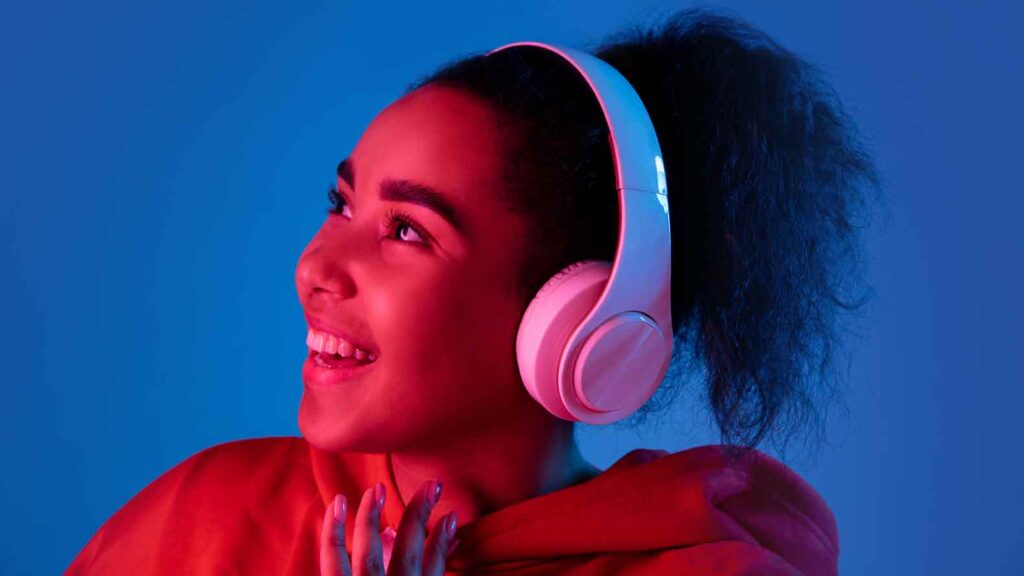
You might also like these
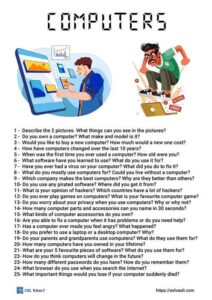
50 computer conversation questions
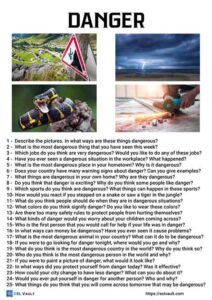
25 danger conversation questions
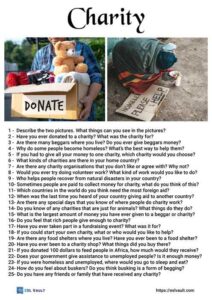
25 charity conversation questions
Free ESL and English teaching resources, no sign up required. Just find what you like, download it and head to class!
Privacy Policy
Share ESL Vault with your friends!
- Writing Worksheets
- Vocabulary Worksheets
- Pronunciation
- Kids worksheets
- Idioms and Expressions
- ESL Puzzles
- ESL Pair Work Activities
- ESL Conversation Questions
- Coloring Pages
- Articles, Lists and Ideas
- Art and Craft Activities
- Ebooks & Courses
- Practice Tests
- Music Vocabulary
Whilst you need to have a broad music vocabulary so that you can answer questions on any aspect of the topic, it’s a good idea to pay particular attention to words and phrases related to your favourite genre of music. There are just so many different types and styles of music that it would be poor use of your study time to try and learn vocabulary for them all.
Most of us enjoy listening to music, or even performing ourselves, which makes music questions fairly easy to answer, especially if it’s about your favourite band, singer or song.
The subject of music could come up in any part of the IELTS exam and this list of music vocabulary is equally relevant for Writing, Speaking, Reading and Listening questions.
This page contains over 130 common words and phrases , together with an explanation for each one and a sample sentence to show it in context. This will help you to learn how to use it correctly.
Don’t try to learn them all. Look at my suggestions below as to the best way to use the list.
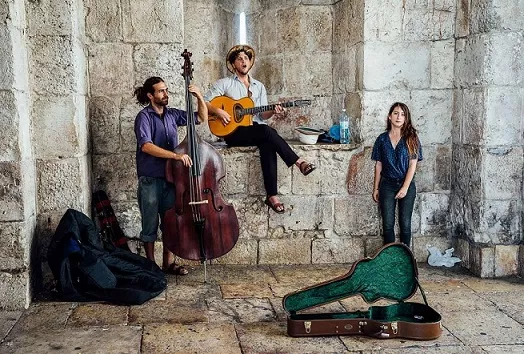
To help you create the best possible answers, I’ve included four things here:
- IELTS-style questions on the topic of music
- Sample answers
- A list of common music vocabulary with definitions & sample sentences
- Links to online reading and listening resources
You’ll find PDF downloads of both the questions and sample answers and the vocabulary list at the bottom of the respective sections.
The questions relate to the Speaking test because this part of the exam offers the broadest range of possible questions on this topic. They give the best opportunity for me to demonstrate the vocabulary and for you to practise using it.
I’ve included IELTS-style questions and answers for all three parts of the Speaking test. I've highlighted keywords and phrases in bold .
You'll find these words and phrases, and many others, in the vocabulary list beneath. There’s also an audio to listen to the pronunciation.
Finally, at the bottom of the page, I've added links to topical articles, short videos and podcasts that will help you to improve both your music vocabulary and your reading and listening skills.
IELTS-Style Speaking Test Questions and Answers
Common music vocabulary is highlighted in bold .
1) What types of music do you like to listen to?
It depends on what mood I’m in but generally, I like easy listening although I am a massive fan of country music and play this genre more than any other.
2) Are there any kinds of music that you dislike?
I’m not really into jazz . It’s just not my taste in music , especially when the musicians improvise . It sounds like they are all playing different tunes and there’s no harmony .
3) Do you ever go to music gigs?
I love listening to live music and go to local gigs at least once a month. I only go to concerts by top bands once in a blue moon as I live a long way from the big music venues .
4) Have you ever been in a music group or a band?
I was a vocalist in my church music group for several years and also sang in the choir when I was in school.
5) Does your country have a traditional type of music or dance?
Folk music and Morris dancing are both traditional in the UK. The music for this type of dancing is often played on the fiddle and accordion , with a drum to give the dancers a good rhythm and beat .
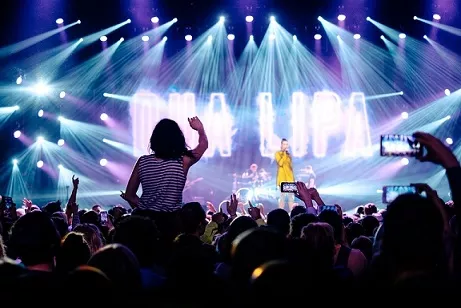
Describe your favourite music group or band.
You should say:
- what group or band is it
- what type of music they play
- how long you have been listening to their songs
and explain why you like this music group or band.
I like many different groups but the one that comes top of my list has to be Bruce Springsteen and the E Street Band.
I first heard their music way back in 1980. I had a boyfriend who had one of their albums and I was a fan from the first track I heard. I’ve been listening to them ever since. The song that really hooked me was “The River”. It’s still one of my favourite songs of all time. It has a slow, haunting melody and beautiful lyrics .
In those days, very few people in my country had heard of Bruce Springsteen but all these years later his band are often on tour here and they play sellout concerts around the world. His nickname is “The Boss” which shows how much people respect him and his great music.
Although the E Street Band are essentially a rock band , there are strong influences of folk , rock and roll, blues and country in their music which helps then appeal to a wide audience .
I was once given two tickets to one of the band’s concerts at Cardiff Arms Park rugby stadium; a great venue . They were a Christmas present and I took my sister along with me. It’s the only time I’ve seen them at a live gig but it’s an event I shall never forget. What a wonderful experience. We sang along to all the songs.
The highlight of the show was when they performed “The River. At the end, the band stopped playing and Bruce led the audience in singing the chorus over and over again. It was amazing and a very special moment. I actually found it quite moving as that was the song that had started me as a fan all those years ago and there I was singing it with him. There was silence when it finally ended and then the applause started and went on for what seemed like forever.
It’s hard to put in words why I like Bruce Springsteen and his band so much. I think it’s because their lyrics are so real while most of the songs have a strong melody that stirs your soul. That’s the best way I can put it.
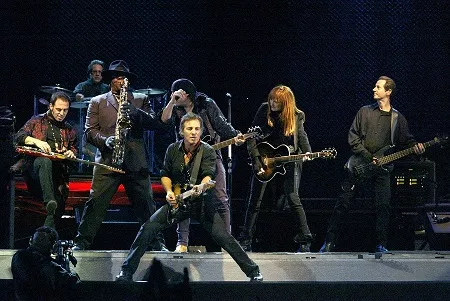
1) Is it important to listen to music with other people?
I think that listening to music can be both a social experience and a personal one. Young people in particular like chilling out with friends while listening to their favourite tracks . There’s also something special about attending a live gig with your mates and singing along to the familiar tunes with all the other fans .
I’ve only ever been to a couple of music festivals but what I remember as much as the bands and the fantastic music was the atmosphere of the events and that was created by all the people who were there.
On the other hand, you can enjoy music just as much when listening on your own. The fact that everywhere you look there are people walking around wearing earphones or headphone seems to be proof of this. So, in conclusion, I would say that while it’s nice to share music with others, it’s not especially important.
2) Why do you think older and younger generations prefer different types of music?
That’s something I’ve never really thought about but I suppose it’s because they grew up listening to different types of music as styles change over time.
Speaking for myself, there are many talented new bands and singers that I enjoy listening to. I often buy their albums and download them onto my MP3 player , but there’s nothing quite like the music I loved when I was in my teens. Perhaps it’s as much to do with the memories it brings back as the music itself.
That’s how I see it and I guess that many other people probably feel the same.
3) Do you think that music should be a compulsory subject in schools?
I do believe that music should be taught in schools. This is for several reasons.
Firstly, it’s important to develop children’s creativity and music is a great way to do this. They should be encouraged to learn to play a musical instrument , but it’s valuable if they just enjoy learning and singing a few songs together.
Secondly, making music is an excellent way of teaching youngster how to work together in a fun way and most of them enjoy performing to their friends.
Finally, most schools put on concerts and other musical performances . Taking part in these gives children confidence and they are an important part of the curriculum.
While older children may drop the subject for exams, having school choirs and orchestras provides other opportunities for them to continue their interest in music.
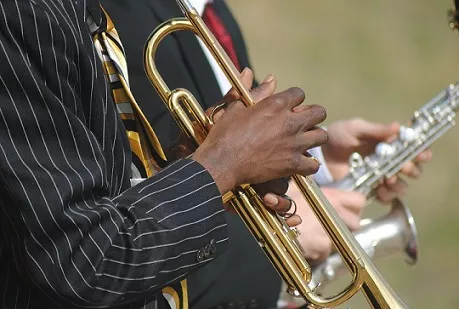
Click this link to get a PDF download of these practise questions & sample answers.
Download PDF Now
* Important
- Do not try and learn this list of music vocabulary.
- Identify the vocabulary you find useful for answering practise questions about this topic.
- Record these in your vocabulary notebook and practise using them regularly.
I recommend that you create your own answers to the Speaking questions on this page. You will find many other IELTS-style practise questions by searching online.
For help on how to learn vocabulary, what to learn and how to record it, visit these pages:
How to Learn Vocabulary for IELTS
Top 6 Types of IELTS Vocabulary & Topic Word Lists
Music Vocabulary – Common Words & Phrases
Music Vocabulary Set 1: Key definitions
Set 1: Music genres
There are many different styles of music around the world. These are some of the mainstream genres but do add others to your own music vocabulary list if there are particular styles you like that aren’t included here.
music genre – a distinct type or style of music
- My favourite music genre is rap.
pop – popular music; music liked by a broad range of the population
- Pop songs are enjoyed by lots of different types of people because they have a good rhythm, a catchy melody, and are easy to remember and sing along to.
rock music – music that is based on amplified instruments, especially the electric guitar and electric bass, and characterized by a strong bass line and strong rhythms
- The Rolling Stones play some of the best rock music ever written.
heavy metal – a type of highly amplified harsh-sounding rock music with a strong beat, characteristically using violent or fantasy imagery
- I like some rock music but find heavy metal a bit too loud.
rap – a type of music in which the words are not sung but are spoken in a rapid, rhythmic way
- Whilst I’m not a great fan of rap music, I do think it’s amazing how they speak so fast and remember the words.
country music – a form of popular music originating in the rural southern US. It is a mixture of ballads and dance tunes played characteristically on fiddle, banjo, guitar, and pedal steel guitar.
- There’s a great country music venue in my town where everyone dresses up as cowboys when they go to gigs.
jazz – a style of music that is generally loud and rhythmic, where the musicians often make the music up as they go along
- Louis Armstrong is still a popular jazz musician many decades after his death.
reggae – a form of music with a distinct beat that originated in Jamaica and is still associated with the Caribbean
- Bob Marley was the first internationally known reggae musician.
blues – African-American music that expresses grief or sorrow about injustice and a longing for a better life
- Did you know that the blues is named after the expression ‘to feel blue’ which means to be sad or depressed?
Music Vocabulary Pronunciation
traditional music – songs and tunes particular to a country or region which have been performed over a long period of time, usually several generations
- Traditional music is part of our culture and should be preserved.
folk – traditional music which included songs written a long time ago and new songs written in the old style
- We have some talented young folk musicians in my country who love performing songs from the old days and writing new folk songs for our generation.
classical music – a form of music developed in Europe mainly in the 18th and 19 th centuries by musicians highly skilled in musical composition
- I find that classical music really stirs up the emotions and I particularly enjoy listening to Beethoven and Bach.
opera – a musical play, often very dramatic, in which most of the words are sung
- I’m not a fan of opera as I really don’t like the style of singing.
musical – a play or film that uses singing and dancing in the story but also includes a lot of spoken dialogue
- Although there are lots of great new musicals being written, I still love West Side Story the best.
instrumental music – music where you just hear instruments playing and there is no singing
- I’m not happy when they play instrumental music on my favourite radio station as I like to be able to sing along the lyrics.
easy listening – a type of music that is not complicated, is pleasant to listen and doesn’t need much of your attention
- When I get home in the evening I put on some easy listening to help me relax after a busy day.
background music – music that is playing while something else is happening
- My friend likes to have background music on while she’s studying but I need a quiet place to work.
Music Vocabulary Set 2: Musical instruments & playing music
If there are any traditional musical instruments popular in your country that you might want to talk about, add them to your own music vocabulary list.
instrument – something you play to make music
Some common instruments:
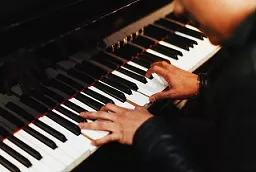
traditional instruments – a type of instrument that has been played for many generations or that was popular in the past, often unique to a country or region
- A sitar is a traditional Indian musical instrument .
to take up (a musical instrument) – to begin learning a musical instrument
- I’m going to take up the guitar.
to read music – to understand and follow written musical notes
- I’m so glad I learnt to read music when I had piano lessons as a child because it really helps me now that I sing in a choir.
to play by ear – to play without reading the musical notes
- Many talented musicians can’t even read music and only play by ear .
talented – to be naturally skilled at something
- I never got the hang of playing an instrument even though both my parents are talented musicians.
to be musical – have a skill in or a great liking for music
- My friend Sally is very musical and can play several different instruments.
self-discipline – the ability to make yourself do things you know you should do even when you do not want to
- You need a lot of self-discipline to learn the piano as you have to practise every day and play boring scales.
sense of accomplishment – to feel like you've achieved something you can be proud of
- Bernie felt a real sense of accomplishment at passing his Grade 2 flute exam.
vocals – a part of a piece of music that is sung
- My parents met in a band. Dad was a guitarist and Mum sang vocals .
Music Vocabulary Set 3: Musicians
musician – a person who plays a musical instrument, especially as a profession, or is musically talented
- It was Jai’s ambition to be a professional musician and play in a famous orchestra.
bass player – someone who plays the bass
conductor – the person who leads the orchestra
guitarist – someone who plays the guitar
keyboard player – someone who plays the keyboard
pianist – someone who plays the piano
drummer – someone who plays the drums
cellist – someone who plays the cello
violinist – someone who plays the violin
vocalist – someone who sings
- Phil Collins was unusual in being both the drummer and lead vocalist in a band, the famous Genesis.
choir – a group of singers singing together
- Lulu really enjoyed singing in the choir , especially when they performed at concerts.
orchestra – a large group of musicians who play many different instruments together and are led by a conductor
- Jason was delighted when he was asked to play violin in the school orchestra .
band – a group of people who sing together and also play instruments
- I was so excited to be asked to play bass guitar in the new band .
group – a collection of people who sing together but do not necessarily play instruments
- All the groups performing in the contest were excellent and it was hard for the judges to pick the best.
composer – a person who writes music, especially as a professional occupation
- My favourite classical composer is Mozart.
Music Vocabulary Set 4: Live music
a performance – the act of entertaining other people by dancing, singing, acting or playing music
- The choir gave a wonderful performance at my sister’s wedding.
a gig – a performance of a band
- My new band is playing their first gig at the weekend.
a show – a performance, especially involving music
- I’m going to my kid’s school this evening to watch them perform in a show .
live music – music performed in front of an audience
- We have many clubs in my city and I often go along with friends to listen to live music .
Collocations:
- live performance
music festival – an organized event, typically lasting several days, featuring performances by various musicians, singers and groups
- I try to go to at least one music festival each summer.
concert – a performance of music by one or more musicians or singers
- My orchestra is going to perform at a concert organized to raise money for charity.
stage – a raised platform on which musicians, actors or entertainers perform
- I felt nervous when I walked out on stage and saw the large audience waiting to hear me sing.
venue – the place where a public event such as a concert happens
- The disused warehouse was the perfect venue for a rock concert.
Music Vocabulary Set 5: Recorded music
recording / recorded music – music that has been stored on a record, CD, computer, etc., so that it can be heard again
- I have recordings of many of my favourite bands stored on my computer.
MP3 player – an electronic device that can store and play digital audio files
- I always carry my MP3 player with me so that I can listen to music whenever I want to.
headphones / earphones – an electronic device that fits over or in the ears for listening to music
- I wear earphones to listen to music on my MP3 player while I’m out jogging.
album – a collection of recordings issued as a single item on CD, record or another medium.
- I can’t wait for my favourite band’s new album to come out.
to download tracks – to obtain music from the internet
- I heard a great band at the gig last night and I’m going to download some of their tracks .
speakers – a piece of electrical equipment for playing recorded sound, through which the sound is played
- The jazz album I got for my birthday sounds amazing through my new speakers .
Music Vocabulary Set 6: Describing music & songs
a song – a usually short piece of music with words that are sung
- My favourite Ed Sheeran song is “Thinking Out Loud”.
lyrics – the words to a song
- Leonard Cohen wrote some of the best lyrics of all time and many artists still perform his songs today.
a melody – the main tune in a piece of music that is often played or sung more than once
- I had trouble picking up the melody of the new piece we started learning at choir rehearsal today and will practise it at home.
a tune – the musical part of a song, especially one that is pleasant and easy to remember
a catchy tune – a tune or a song that's easy to remember and stays in your mind so that you find yourself humming or singing it
- I heard a really catchy tune of on my kid’s TV programme this morning and I’ve been humming it all day.
piece of music – a musical composition, especially but not necessarily an instrumental one
- My piano teacher has given me a new piece of music to learn before my next lesson.
taste in music – the music someone likes
- My boyfriend and I have the same taste in music and go to live gigs whenever we can.
rhythm – a regular, repeated pattern of sounds
- I love the rhythm of reggae music.
beat – a characteristic rhythm in some types of music
- Rap music has such a distinctive beat .
harmony – a pleasant musical sound made by different notes being played or sung at the same time
- One of the reason I enjoy country music so much is because many songs have lovely harmonies .
to be out of tune – to play or sing slightly wrong notes
- My dad likes to sing along the radio but is so out of tune that it sounds terrible.
to be in tune – to play or sing with the correct pitch
- Before the performance, the guitarist tightenend the strings of his guitar so that it was in tune .
to have a great voice – to sing well
- I think my friend should enter the singing competition as she has a great voice .
to be tone deaf – to be unable to distinguish the different notes in music
- I’d really like to able to sing but I'm tone deaf so I don’t think there’s much chance.
chorus – a regularly repeated line or group of lines in a song
- The choir sang lots of well-known songs and encourages the audience to sing along to the choruses .
upbeat – cheerful or lively
- If I’m feeling sad I put on some upbeat music and feel better almost at once.
nursery rhyme – a simple traditional song or poem for children
- I can still remember many of the nursery rhymes I learnt as a child.
lullaby – a quiet, gentle song sung to send a child to sleep
- If my baby wakes up in the night I just sing him a lullaby and he soon goes back to sleep.
sing to sleep – to make someone feel sleepy by sing them a gentle song
- My mum used to sing us to sleep when we were young.
Music Vocabulary Set 7: Music & the emotions
passionate – to feel strongly about something
- I’m passionate about playing the saxophone.
to cheer up – to cause to feel better
- Upbeat music always cheers me up if I’m feeling down.
relax / chill out – to become less tense or anxious
- After a stressful day at work, I lie in the bath listening to classical music as this helps me to chill out .
energise – to make someone feel energetic or eager
- Reggae music energises me so that’s what I Iisten to when I feel sluggish and need motivating.
Music Vocabulary Set 8: Other music vocabulary
rock band – a group of musicians that play rock music
- One of the great things about living in Manchester is that all the top rock bands perform here.
pop star – a famous singer or musician who performs pop music
- Many teenagers have the dream of being a pop star as they want to be rich and famous.
famous – known about and recognized by many people
- The Beatles are one of the most famous bands ever to have existed.
frontman – lead singer of a band
- Roger Daltrey has been the frontman of The Who for over 50 years.
fan – a person who admires, supports or follows a person, band or team
- I’ve always been an Elvis Presley fan even though he died before I was born.
huge following – to have a large number of fans
- Modern pop stars have a huge following which they communicate with on social media.
to go on tour – to go on a planned series of performances around a region or country
- I hope my favourite band go on tour again soon as they put on an amazing live show.
sellout – a performance or sports event for which no more tickets are available because it’s so popular
- The Bruno Mars concerts were a sellout at every venue on the tour.
record company – a business that makes and sells musical recordings
- Our band is getting well-known across the country and we’re hopeful of getting signed by a record company .
record label – a brand or trademark associated with the marketing of music recordings and music videos
- You know you’ve hit the big time if you get signed up with one of the big record labels such as Sony.
hit the big time – to become successful and/or famous
- After winning the TV talent show, Shelley hit the big time and was soon singing in huge venues around the world.
a hit – to be popular ; a record that sells lots of copies
- “Happy” was a massive hit for Pharrell Williams.
the charts – a list of individual songs or musical performances ranked in order of number of sales or downloads over a specific period of time which indicates their popularity
- Ariana Grande’s new record is brilliant and I’m not surprised it’s made it to No.1 in the charts .
to sing along to – to join in singing
- My favourite songs in the charts are always the ones you can sing along to .
a sing-song – to sing informally, often with other people
- I have wonderful memories of my gran playing popular songs on the piano at family get-togethers and everyone joining in for a sing-song .
music-lover – someone who really enjoys listening to music
- I can’t say I’m a great music-lover although I do enjoy listening to the radio when I’m driving.
applause – approval or praise expressed by clapping the hands together
- The applause continued even after the band had left the stage.
- a round of applause – an outburst of clapping from an audience to show approval
- The audience gave the choir an enthusiastic round of applause as they came on to perform.
to be into / not into – to be interested in or involved with / to not be interested in
- I’m really into folk music but not into jazz at all.
to improvise – create and perform music, drama or verse spontaneously or without preparation
- I don’t enjoy listening to jazz when it’s improvised as it sounds like the musicians are all playing different tunes.
once in a blue moon – hardly ever
- I’m definitely a music-lover but only go to live gigs once in a blue moon .
Click this link to get a PDF download of this list of music vocabulary.
Ways to Improve Your Music Vocabulary
One of the best ways to improve your music vocabulary is through reading. Watching topic related YouTube videos and listening to podcasts is also hugely beneficial.
Here are some online resources I recommend.
Music Articles
These online publications contain music news and related articles. Most music genres have their own publications so search for those that particularly interest you, e.g. "Jazz magazines" or "Jazz articles".
BBC News - Music
The Guardian - Music
I love TED Talks. They are short videos with a powerful message and are generally very interesting. They’re ideal for improving your vocabulary and give valuable listening skills practise.
Search TED Talks - Music to help you improve your music vocabulary. It will take a bit more searching to find something relevant than with some other topics but it's worth seeing what you can find.
All Topic Vocabulary

Would you prefer to share this page with others by linking to it?
- Click on the HTML link code below.
- Copy and paste it, adding a note of your own, into your blog, a Web page, forums, a blog comment, your Facebook account, or anywhere that someone would find this page valuable.
Like this page?
- IELTS Vocabulary
- Back To Top
* New * Grammar For IELTS Ebooks

$9.99 each Full Set Just $ 23.97
Find Out More >>
IELTS Courses

Full details...

Vocabulary Topic Packs
Learn vocabulary for common topics while getting valuable practice answering the different types of IELTS questions.
Just $5 each
Find out more >>
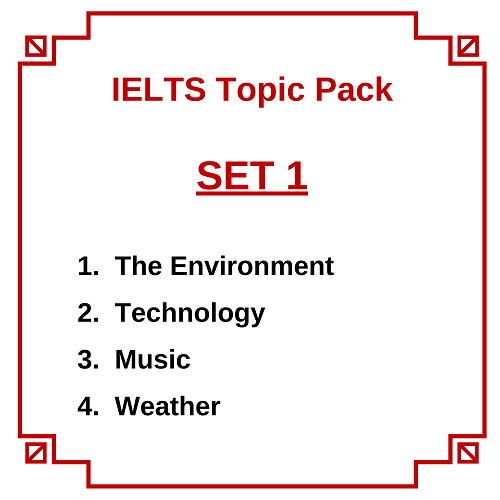
Testimonials
“I am very excited to have found such fabulous and detailed content. I commend your good work.” Jose M.
“Thanks for the amazing videos. These are ‘to the point’, short videos, beautifully explained with practical examples." Adari J.
"Hi Jacky, I bought a listening book from you this morning. You know what? I’m 100% satisfied. It’s super helpful. If I’d had the chance to read this book 7 years ago, my job would be very different now." Loi H.
"Hi Jacky, I recently got my IELTS results and I was pleased to discover that I got an 8.5 score. I'm firmly convinced your website and your videos played a strategic role in my preparation. I was able to improve my writing skills thanks to the effective method you provide. I also only relied on your tips regarding the reading section and I was able to get a 9! Thank you very much." Giano
“After listening to your videos, I knew I had to ditch every other IELTS tutor I'd been listening to. Your explanations are clear and easy to understand. Anyways, I took the test a few weeks ago and my result came back: Speaking 7, listening 9, Reading 8.5 and Writing 7 with an average band score of 8. Thanks, IELTS Jacky." Laide Z.
Contact
About Me
Site Map
Privacy Policy
Disclaimer
IELTS changes lives.
Let's work together so it changes yours too.
Copyright © 2024 IELT Jacky
All Right Reserved
IELTS is a registered trademark of the University of Cambridge, the British Council, and IDP Education Australia. This site and its owners are not affiliated, approved or endorsed by the University of Cambridge ESOL, the British Council, and IDP Education Australia.

Daily English Conversation Practice by Topic – Lesson List
Download Full Lessons Package – Daily English Conversation by Topic (mp3+pdf)
Listening is THE KEY to better English speaking . The more REAL English conversations you listen to, the more fluent you will become, to be sure.
For a small one-time investment, you can get the whole package of 75 lessons. Put it into your phone or MP3 Player and take your English learning ANYWHERE.
You can learn English on the bus while going to work. You can learn English while exercising or walking. You can learn English while shopping. You can learn English while sitting at a coffee shop, etc.
Remember, DEEP LEARNING is the No. 1 secret to English fluency . If you want to speak English fluently and automatically, you have to repeat the same lesson over and over again until you MASTER it.
WHAT YOU WILL GET:
- 75 mp3 files for 75 lessons (each lesson lasts for 1 -2 minutes).
- 1 pdf file for lesson transcript (79 pages).
Take advantage of your short free time during the day to do a lot of repetition, and you will be amazed at how fast your English speaking improves . Get started today!
P/S: If you want to download more lesson packages with a discounted price, check out 0ur Resources Page here .
Related Lessons
Plastic Surgery
Handcraft Items
Technological Advancements
A Health Problem
A Celebrity
A Creative Person
Leave a Reply:
Save my name, email, and website in this browser for the next time I comment.

Do you love music? In your native language, is music a major topic that you can use to connect with people?
If you are working to become fluent in English, learning how to talk about music is a great way to build connections with native speakers.
In today’s episode we will talk about how music can take you back to a moment in your past.
You might be surprised at how universal music can be, and we’re going to look at that and how you can talk about some of your favorite memories in this way.
Get Your Transcripts Today!
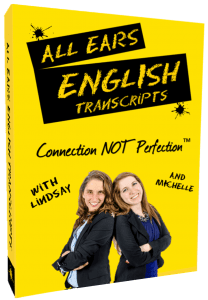
Make sure you understand every word you hear on All Ears English.
Bring your English to the advanced level with new vocabulary and natural expressions. Subscribe and get the transcripts delivered by email.
Learn to speak naturally with the American accent.
Click here to subscribe and save 50%
Music Can Be Very Powerful
Music can transport you to so many different places and times.
Music can take you back to a moment in time and allow you to reminisce and remember great memories.
Music is a part of us and it’s a part of how we put meaning in our lives.
You want to be able to communicate this to others, and this allows for some great connections.
You may start a conversation about a favorite band, or even discuss how a certain song can take you back to a time in your life.
Music is universal and crosses cultures, and therefore it’s a great topic of conversation no matter who you are talking to.
There is great power in music, and it can be a useful way of making connections in a very natural way.
Great Phrases To Talk About Music
There are some great phrases to use to make connections and start conversation about music.
These phrases can be a great way to introduce your memory, and to get the conversation started.
- This music really brings me back: It means that as soon as you hear this piece of music, you get a memory immediately in your mind. You can almost feel yourself in that moment of time. It’s as if the music transports you back to that memory or that place in time.
- This calls to mind___________ : This is another way of introducing a memory. It’s a great way to start a conversation and others may be able to relate to that memory. Since music is so universal, many people have memories pertaining to music. This phrase is a great way to introduce your memory.
- This reminds me of ________ : This is another way of saying that a song brings about a memory. This is a common phrase to say that something sends you back to a specific moment of time. You might be able to think back to what you were doing or who you were talking to. The memories can be strong, and so this is a great phrase to introduce that. Music can be very powerful, and so can a certain smell. These things act as very strong triggers for memories.
- It sends me right back/puts me right back : This is another way to show that music brings about memories. You may use this to place yourself in a very specific memory or time of your life. This allows you to start a conversation and share a very specific memory, and others like this and may very well want to share their own memories.
These phrases are all great for talking about music and your favorite memories.
Try them and see how they allow you to share, but also invite others to share with you too.
Music As A Way of Connecting
The connections can be very strong through music.
You are making yourself somewhat vulnerable when you share a memory–and this makes for great connections!
You don’t need to overthink making a connection or starting a conversation.
These are your stories to share, and when you open yourself up like that then others are likely to want to share with you.
If you allow yourself to open up then you can create some really great conversations.
People love to connect over music because this is the key to some really great memories.
Music is almost like a universal language, and it’s something that we can all relate to.
If you allow yourself to open up, then you can share some great memories of your own centered around music.
This is a great way to start conversation, and it can lead to some wonderful connections.
We all have memories centered around music, so take the time to share yours with others.
This can really help to take your conversations to another level, and music can help you to make connections like nothing else.
If you have any questions, please leave them below in the comments section.
We’ll get back to you as soon as we can.
Bring your English to the advanced level with new vocabulary and natural expressions.
Subscribe and get the transcripts delivered by email.
Related Posts
- Presentations and Public Speaking
- Business English
Business English 238: Be Prepared for Impromptu English
- English Vocabulary
AEE 2175: Make It a Point to Learn These English Phrases
Business english 234: multitude or plethora what are quantifiers and why do they matter.

Privacy Overview
Gather Lessons
100 Questions about Music for the ESL Classroom
I love music and I think that asking questions about music is one of the ways to generate very interesting connversation.
There are different types of music so I don’t expect that all of us like the same things.
These are some of the most common types of music out there
Table of Contents
70 Music Conversation Questions
Music taste, your daily routines and music, music in the digital world, concerts and music festivals, music questions: radio, music questions: feelings and music, music questions: music over the years, music questions: lyrics, related posts.
These are 70 music conversation questions to help you have interesting conversations with classmates, students and friends
These are some questions to learn more about your music taste
- What kind of music do you like?
- What type of music do you dislike?
- How often do you like to music?
- Where do you listen to music?
- What are some music videos that you like?
- Who is your favorite singer?
- What’s your favorite band?
- What’s your favorite song?
- What types of music do people listen in your country?
- Which is more important to you, music or TV?
- hat music did you listen when you were a kid?
- Have you ever bought an album?
- What music do you like to dance?
- What would life be without music?
- Do you have a favorite songs from the 90’s?
- Do you like karaoke? Do you have a song that you often sing?
- What movie has a very memorable soundtrack?
- Do you prefer music in English or in your own language? Why?
- What musician would you most like to meet? Why?
- Can you name three songs in Spanish that you like?
- Who is the best female singer of all time? Why?
These are some questions about how music fits in your daily routine
- Do you listen to music when you drive to work or school?
- Do you listen to when you do exercise?
- How much time do you spend listening to music each day or week?
- Do you ever listen to music when you running or cycling?
- What’s the best time and place to listen to music?
- Can you name three catchy songs?
Music has changed quite a lot in the recent years so we our methods to listen to music have changed.
- Do you listen to music on spotify?
- Do you watch music videos on Youtube?
- Do you think it is okay or not okay to download music illegally?
- What’s your favorite app to listen to music?
- Have you ever bought music online?
- How many mp3 songs do you have on your mobile device?
- How do you check the lyrics of your favorite songs?
- Have you ever heard of MusixMatch?
- Have you ever illegally downloaded music?
- Do you create playlists on Youtube?
- What do you think about spotify suscriptions?
- Do you ever burn CD’s ?
Concerts and music Festival are so much and telling your friends about them can create a bond with people
- Do you like to listen Electronic music?
- What do you think about music festivals?
- What do you think about Electronic Music Festivals like Tomorrowland?
- What do you know about electronic music festivals?
- Would you like to go to a electronic music festival?
- Have you ever been to a concert?
- Would you like to go to a concert?
- Do you ever watch concerts or music festivals on Youtube?
I don’t know you but I stopped listening to the radio a long time ago
- Do you listen to the radio?
- How often do you listen to the radio?
- Do you have a Favorite radio station?
- Do you listen to any radio station when you drive?
- Do you think that radio station will die eventually?
- What music do you like to listen when you are in love?
- What music makes you feel relaxed?
- How does music makes you feel?
- What are three songs that gets you excited?
- Do you think that music changes how you dress and act?
- What music do you listen to cheer you up?
- Is there a song that makes you emotional?
- If you had intro music, what song would it be? Why?
- What song best represents you, or your attitude to life?
- What do you think of the music your parents listen to?
- How has music changed over the years?
- Has your taste music changed over the years?
- How has your music tasted changed over the years?
- What do you think about the music that teenagers are listening today?
- What is your favourite lyric line from a song?
- Which song has the best lyrics?
- What is your favorite song sung in a language you don’t understand?
- Where do you check the lyrics of your favorite songs?
- Have you ever tried using MusixMatch to check the lyrics of your favorite songs?
These are some posts about ESL conversation questions
- 40 Questions with Will: Guide & Examples
- 30 Questions with Going to
- 40 Present Perfect Questions
- 30 Present Continuous Questions
- Simple Past Conversation Questions
- 40 Simple Present Questions for the ESL Classroom
- 40 Personal Information Questions
I am Jose Manuel, English professor and creator of EnglishPost.org, a blog whose mission is to share lessons for those who want to learn and improve their English

40 Swimming Discussion Questions


Discussion Questions about Transportation

15 Questions about the Solar System
- Communication
- English Skills
- Basic Pronunciation
- Basic Vocabulary
- Step By Step Guide
- Exam Techniques
- eJOY Discovery
- Learner’s Stories
- eJOY | English Learning Blog
- eJOY Extension

Academic_Economics_Word List

New Feature on eJOY EPIC: The integration of ChatGPT

Personal feelings – Intermediate 1 – Speaking session 2

Business Meeting – Intermediate – Speaking session 01

Why the IPA is different in some dictionaries and what to…

6 Website Tự Học Digital Marketing Online Cho Người Mới Bắt…
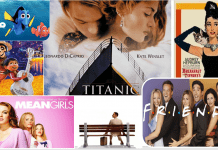
Top 15 Must-watch English Movies for Beginners

For Kids: Learn English through Film with 11 Famous Cartoon Movies

Reading IELTS – Test 1 – Cam 13

READING_IELTS 13_TEST 2
Ielts reading_ barron’s ielts_test 5, ielts reading_ barron’s ielts_test 6.

How to learn Coursera courses for free
Instructions for features on the AI Explanation pop-up
How to look up other dictionary sources on ejoy extension.
Look up feature with Pro AI dictionary on eJOY eXtension

Speaking Topic 9 – Music
Our next speaking topic is Music. If you are new here and want to practice speaking on this topic, please fill out the form: https://forms.gle/BpaA9KyyeRmkJfmU6
You can refer to this introduction to understand the program “Pair speaking practice with eJOY”.
1- Discussion questions for Topic Music
- Do you like listening to music?
- What type of music do you often listen to? How do you feel after listening to them?
- Who is your favorite artist? Why do you like her/him?
- Have you ever been to a concert or have you ever bought an album? Which one would you love to go to in case you haven’t?
- Can you sing or can you play any kind of musical instrument?
- Do you think music will change in the future?
These are suggested questions. You may not want to limit your conversation to those questions. Feel free to add your own and raise any question to your partner during the online meetup. Besides, you may want to have an ice-breaking session at the beginning. Also, don’t forget to wrap up at the end of the discussion.
2- Suggested videos – Topic Music
You need to train your ears to get familiar with how native speakers talk about Music, and also to broaden your vocabulary.
eJOY Epic – Laptop
If you own a PRO eJOY account, you can learn with the following video to practice listening comprehension, grammar, and vocabulary.
Learn with Why We Create Music .
Read more: How to learn on Epic .
eJOY App/ Go web – Mobile & Laptop
Below are English videos that you can practice with 4 skills (listen-speak-read-write) on eJOY App and eJOY Go web.
- Music is a force
- Recommending music
- How Music Affects Your Brain
- How to learn on eJOY App
- How to learn on eJOY Go
3- Prepare for the talk
This is the to-do list for you:
- Watch the suggested videos to get some ideas and vocabularies. Add new vocabularies from section 5 as well, if you need them. Use eJOY extension (laptop) or eJOY Reader app (mobile) to save them.
- Write your own answers to the questions in section 1 of this article. Try to answer them out loud by yourself as well.
- Set up your device, the platform you choose to make a call to your partner. Make sure your internet works well and you have a quiet place.
Please be noticed that:
- Audio call is used to make sure the connection stable
- Have free talk and maintain your conversation as long as possible with no limit.
- Turn on recording (if possible) so that you will have your audio file to review after the talk
4- Check in to find your speaking partner for topic Music
When you have done the homework, try your best to write down the answers to the discussion questions and do rehearsal on your own. And then, fill out the check-in form to help us find your perfect speaking partner who has the same English level, same level of confidence, and same time slot with you.
5- Vocabulary
- adoring fans
- background music
- a catchy tune
- classical music
- melody/tune
- You can download tracks once you have signed in to your SoundCloud account
- She p l ayed three long notes on the piano.
- to have a great voice
- I’ve got no sense of rhythm
- to go on tour
- a huge following
- This song is represented by bass, tenor and alto duets, respectively.
- She sings so beautifully that many people don’t think she is giving a live performance.
- You should always sing in tune, not out of tune.
- 2012 is considered to be the year with the most massive hits of the decade.
- Losing my voice at your favourite music festival
- If you want to learn to play a musical instrument, it might be a good idea to begin on something simple.
- She inherited her musical talent from her mother
RELATED ARTICLES MORE FROM AUTHOR

Speaking Topic 10 – Shopping

Speaking Topic 1 – Family

Speaking Topic 2 – Friends

The Ultimate Guide to Learning English with Netflix movies

Learn English with Movies: A Complete Guide
List of Music Terms
acoustic (adjective): without inbuilt electrical equipment to amplify the sound - I can play acoustic guitar, but I can't play electric guitar.
album (noun): a collection of songs released as a digital download or a 12-inch LP record - Do you have Michael Jackson's album Thriller ?
alternative hip hop (noun): any style that isn't mainstream commercial hip hop - Have you heard much alternative hip hop?
alternative rock (noun): non-mainstream rock music inspired by punk and post-punk - My sister likes pop music, but I like alternative rock.
ambient music (noun): calming, atmospheric background music - Have you heard Brian Eno's ambient music?
amplify (verb): to make sounds louder, esp. by using electrical equipment - If we don't amplify the drums, they'll be hard to hear.
artist (noun): a professional singer, musician or songwriter - Taylor Swift has become one of music's best-selling artists.
art music (noun): music written and performed by professional musicians mostly for the upper classes, like classical Indian music and European opera - Wealthy Chinese lords paid musicians to play relaxing art music, while poor people played lively folk music for fun.
audio editing software (noun): software used to produce music, movie soundtracks, etc. - Before we had audio editing software, we used tape loops.
authentic (adjective): real or genuine - You can still see an authentic Chinese opera in Beijing.
autoharp (noun): a small harp with buttons to press for playing chords - Is the autoharp used much in bluegrass music?
avant-garde (adjective): new, unusual and experimental - Harry makes avant-garde electronic music in his spare time.
backbeat (noun): a beat counted as "two" or "four" in 4/4 rhythm - Can you hear the snare drum playing on the backbeats?
backing singer (also "backing vocalist") (noun): a singer who gives vocal support to a lead singer - Tessa was one of Joe Cocker's backing singers.
ballad (noun): a slow song usually about love - Janis sings up-tempo rock songs as well as slow ballads.
banjo (noun): an African American stringed instrument based on the African kora - Do you play four-string or five-string banjo?
bar (noun): one of many small sections in a piece of music that contains a fixed number of beats - Each bar in the song has four beats.
bass (guitar) (noun): an electric guitar with thick strings for playing low "bass" notes - We need someone who can play bass.
beat (noun): the regular pulse in music that dancers move to and audiences clap to - Dance music always has a strong beat.
beats (noun): the breakbeat rhythms that MCs rap to in hip hop music - Who produced the beats on this album?
bebop (noun): a complex style of up-tempo jazz from the 1950s - The best bebop player I ever heard was Charlie Parker.
big band (noun): a large jazz band, esp. one that plays big band jazz - Most popular singers of the 30s and 40s had their own big bands.
big beat (noun): an EDM genre with breakbeats, heavy bass, vocals and samples - Maxim loves that big beat sound.
block party (noun): a free party on the streets of a city block - Are you going to the block party on Saturday?
bluegrass (noun): a style of country music based on old-time Appalachian music - We're going to a bluegrass concert tonight.
(the) blues (noun): African American guitar-based folk music that led to R&B and rock - I'm learning some old blues songs.
bpm (noun): beats per minute - The fastest drum and bass tracks are around 160 bpm.
boy band (noun): a group of three or more boys or young men who sing and dance - My little sister loves that Korean boy band Super Junior.
brass (noun): instruments made of brass, like the trumpet, trombone and tuba - Harry plays trumpet in a brass band.
break (noun): a moment in which most instruments stop, but one or two continue, esp. drums - We sampled a snare-drum break from an old jazz record.
breakbeat (noun): a syncopated jazz or funk rhythm of the sort sampled in hip hop music - Hip hop and dubstep use breakbeats, not disco beats.
breakdancing (noun): a style of street-dancing in hip hop culture - The breakdancing in this Turf Feinz video is incredible.
breakdown (noun): section of a dance track with less singing and more percussion - Does the track have a good breakdown?
call and response (noun): two musical phrases, one of which answers the other - The call and response is before the last chorus.
catchy (adjective): enjoyable when first heard, and difficult to forget - It's so catchy! I can't stop hearing it in my head.
(the) charts (noun): lists of the best-selling songs of the previous week - Our single got to the top of the charts!
chord (noun): three or more notes played together - Lots of great songs only have two chords, you know.
chorus (noun): the part of a song with the same melody and words each time it's heard - I'll sing the verses, and you sing the choruses.
classic (adjective): very good and highly-regarded for a long time - Neil loves those classic American cars of the 50s.
classical music (noun): European orchestral and keyboard music that's written by composers - Sayoko loves classical music, especially Chopin's piano pieces.
collaborate (verb): to work together with someone to produce something - Has Kanye collaborated with Drake yet?
commercial (adjective): made in order to be popular and make money - Garth's country music is much too commercial for me.
contemporary R&B (noun): recent R&B that mixes soul, pop and hip hop sounds - Contemporary R&B is really popular these days.
crossover hit (noun): a country, dance or hip hop song that's on the pop-music charts - We'll all be rich if we have a crossover hit.
country music (noun): a genre of American music with origins in the rural folk music of Europe - Harry only listens to country music.
country pop (noun): a style that mixes pop and country music - Country pop is really popular in America these days.
country rock (noun): a style that mixes rock and country music - He doesn't like country pop much, but he loves country rock.
dance-pop (noun): up-tempo pop music with a dance rhythm - Her dance-pop singles always become hits.
deejay (verb): to perform the skills of a club or hip hop DJ - Who's deejaying for Nas these days?
disco (also "discotheque") (noun): a 70s nightclub in which DJs played dance records - The gay discos in New York were fabulous.
disco music (also "disco") (noun): 70s dance music with a steady four-on-the-floor beat - My sister loves dancing to disco music.
DJ (or "disc jockey") (noun): someone who plays records at dance clubs or on radio - Do you like the tracks this DJ's playing?
DJ mixer (noun): a small mixer made for DJs - All you need is two turntables, a DJ mixer and some records.
double bass (noun): a large stringed instrument for playing low notes - In jazz, double bass strings are plucked instead of bowed.
drop (noun): a point in EDM when the rhythm and sounds suddenly change - If it's a really great drop, everyone goes crazy.
drum and bass (or "DnB") (noun): an EDM genre with breakbeats, heavy bass and a fast tempo - Let's make a drum and bass track.
drum kit (noun): a set of drums with a bass drum, snare drum, tom-toms, hit-hat and cymbals - How much did your drum kit cost?
drum machine (noun): an electronic instrument that makes sequenced drum sounds - Our drummer quit, so we're using a drum machine now.
dubstep (noun): an EDM genre with breakbeat rhythms, very heavy bass and a slow tempo - My parents don't even know what dubstep is!
duo (noun): two people who make music or perform together - Who's on your list of best hip hop duos?
dynamic (adjective): lively and having a lot of energy - She's one of the most dynamic singers I've seen perform.
EDM (noun): electronic dance music - That band didn't start out playing EDM, did they?
explicit (adjective): offensive, obscene or "rude" language - Has the album got an explicit language warning?
fan (noun): someone who likes a particular artist or band very much - Our teacher's a really big fan of Eminem.
feedback (noun): a high-pitched noise made when a microphone is close to a loudspeaker - How do you control feedback so it fits the music?
fiddle (noun): another word for "violin", esp. in country and folk music - Who's playing fiddle on that record?
flow (noun): the ability to rap rhythmically and stylishly - He's been practising, so his flow's getting better.
folk music (noun): traditional music from a particular region or country - Did you hear any folk music while you were in Chile?
folk rock (noun): a style that mixes folk and rock music - We heard lots of folk rock bands in San Francisco in the early 60s.
formula (noun): a method or plan that's believed to succeed - What's your formula for success in business?
four-on-the-floor (noun): a 4/4 rhythm with bass drum on the beat and hi-hat on the offbeats - Terry's sick of playing those four-on-the-floor disco beats.
funk (or "funk music") (noun): rhythmic groove-based music that developed from soul in the 60s - Bootsy Collins was the best funk bass player ever.
funky (adjective): having the feel of funk music, esp. rhythmically - That track Superstition by Stevie Wonder is incredibly funky.
gangsta rap (noun): hardcore-style rap from Los Angeles - My cousin still buys gangsta rap records!
genre (noun): a kind or style of music, movie, TV show, painting, etc. - In music classes at school, the only genres we studied were classical music and jazz.
G-Funk (noun): funk-based subgenre of gangsta rap - What's your favourite G-Funk track?
glam rock (noun): a rock style in which male artists wore make-up and glamorous clothes - David Bowie had many styles besides glam rock.
gospel music (noun): rhythmic church music of African American Christians - They sang great gospel music in those old churches.
graffiti art (noun): street art that's drawn, painted or sprayed in public places - What do you think of Banksy's graffiti art?
groove (noun): a highly-rhythmic pattern repeated for a long time, esp. in funk music - Hip hop artists still sample James Brown's funk grooves.
grunge (noun): punk-based alternative rock that developed in the USA in the 90s - Wasn't Nirvana the first grunge band?
hardcore rap (noun): a tough style of New York hip hop music - Hardcore rap's like those old gangster movies.
harmony (noun): the combining of musical notes that sound good when played or sung together - If we don't sing in harmony, it'll sound terrible.
heavy metal (noun): hard rock with heavy bass, complex drumming and singers who scream - My dad used to be in a heavy metal band.
hi-hat (noun): a pair of foot-operated cymbals that's part of a drum kit - Drummers play bass drum with one foot and hi-hat with the other.
hillbilly (noun): an impolite word meaning a poor mountain farmer in the U.S.A. - In Nashville, old-time music was called hillbilly music.
hip hop (also "hip hop") (noun): a musical genre in which artists rap over beats and sampled sounds - I love Kanye West's hip hop albums.
hit (noun): a best-selling song on the pop-music charts - It's a great song. It'll be a hit for sure.
honky tonk (noun): a country music style known for its powerful, emotional songs - Who's your favourite honky tonk singer?
hook (noun): part of a song that's easily remembered, often a chorus - The Knack's My Sharona has one of greatest hooks ever!
horn section (noun): a group of musicians playing brass instruments and saxophones - How many songs does the horn section play on?
house (or "house music") (noun): 80s dance music similar to disco but with more electronic sounds - Those old house tracks still sound great.
house band (noun): a group of session musicians who work for a music company - House bands don't become famous, but singers do.
house producer (noun): one of a record company's full-time music producers - How many house producers does Sony Music have?
hymn (noun): a religious song that's sung in church - My grandma loves singing those old hymns.
improvise (verb): to invent music spontaneously while playing - If you want to be a jazz musician, you have to learn how to improvise.
instrumental (adjective): played on instruments, without vocals - There's a long instrumental section in the middle of the song.
jazz (noun): a genre in which artists improvise within a rhythmic and harmonic framework - We've got all John Coltrane's jazz records.
jazz rap (noun): rap music made with jazz samples or instruments - Molly doesn't like jazz rap much.
Latin music (noun): a genre of popular music in Latin America and Spain that has complex rhythms - Latin music makes me want to dance.
lead guitar (noun): a guitar on which melodic lines and solos are played - Who's playing lead guitar in your new band?
live (adjective): played at a concert in front of an audience - You don't hear live music in dance clubs anymore, only recorded music.
lyrics (noun): the words of a song - If you don't listen to the lyrics, you won't know what a song is about.
mainstream (adjective): normal and preferred by most people - Most people like mainstream hip hop more than alternative hip hop.
mandolin (noun): a stringed instrument like a guitar with a curved back - You can hear mandolin on those early old-time recordings.
MC (or "Master of Ceremonies") (noun): a DJ's onstage announcer, esp. one who raps - Does your MC ever forget his raps?
melody (noun): a tune, or the notes of a song - Can you whistle the song's melody?
mixtape (noun): a collection of free tracks, usually downloadable or on cassette tape - Let's download some more mixtapes.
modal jazz (noun): jazz that uses Arabic or Indian modes instead of European scales - McCoy Tyner played modal jazz with John Coltrane.
neo soul (noun): a style that mixes contemporary R&B and 60s or 70s soul - Angelina played some great neo soul tracks at our party.
offbeat (noun): a beat between the main beats, often counted as "and" by musicians - Disco has hi-hats playing on all the offbeats.
old-time music (also "hillbilly music") (noun): country music originating in the Appalachian mountains of the USA - Do people still play old-time music much?
outlaw country (noun): a style of country music popular in the 1960s - Johnny Cash was one of those outlaw country singers .
pedal steel guitar (noun): an electric steel guitar on a stand with foot pedals for changing the sound - He's teaching us pedal steel guitar .
pop music (noun): a popular music genre with catchy songs that are easy to remember - I love listening to pop music.
pop song (noun): any song that follows the pop music formula - Paul's favourite pop song is God Only Knows by The Beach Boys.
pop soul (noun): a style of soul music with a pop-music sound - Mum's listening to pop soul again.
popular music (noun): music that many people like and buy, like rock music and heavy metal, hip hop and rap, pop songs, etc. - Our music teacher knows lots about classical music, but nothing about popular music.
post-punk (adjective): of a style of experimental rock that developed after punk - Have you heard of a post-punk band called Joy Division?
pounding (adjective): having a very strong, loud and steady beat - Those pounding disco tracks are still great to dance to.
power chord (noun): a basic chord that can add power to music - The Kinks used lots of power chords in their song You Really Got Me.
producer (noun): someone who oversees the recording of music - Who was the producer on Nirvana's first album?
progressive EDM (noun): EDM made for listening to as well as dancing to - I listen to progressive EDM when I'm on the bus.
protest song (noun): a song with lyrics that protest against war, injustice, etc. - Why don't people write protest songs anymore?
psychedelic (adjective): related to powerful drugs like LSD - Lots of bands used psychedelic designs on their album covers in the 60s.
punk (rock) (noun): 70s and 80s rock music with short, fast, noisy songs - The first punk band I saw was The Sex Pistols.
rap (1) (noun): a set of lyrics rapped to a hip hop beat - He's never done a rap about getting a job, has he?
rap (2) (verb): to speak rhythmically in rhymes over a hip hop beat - You want me to rap? I've never rapped in my life!
rapper (noun): an artist who performs raps over a hip hop beat - My daughter wants to be a rapper when she grows up.
rave (noun): a large dance party held outdoors or in an empty building - Did you go to any of those raves in the 90s?
record (noun): a thin disc of black plastic on which recorded music is imprinted and sold - I bought lots of punk records in the 70s.
recording (noun): a piece of music that's recorded in a studio or at a concert - It's one of the best recordings they've made.
recording session (noun): time spent recording in a music studio - We've got a recording session on Monday morning.
reggae music (noun): a genre of music that developed in Jamaica in the 1960s - If you want to hear reggae music, try Bob Marley and the Wailers.
remix (verb): to change a track's sound-level mix and add effects - When he remixed our song, he made the bass drum much louder.
reverb (noun): an electronic sound effect similar to an echo - They used lots of reverb on those early Beach Boys songs.
revival (noun): the return to popularity of an old style or form - There was a rockabilly revival during the punk music years.
rhyme (noun): a word that ends with the same sound as another word - If you don't use rhymes, you can't call it rapping.
rhythm (noun): a pattern of beats and sounds that musicians play in time to and dancers move to - The rhythms of African music are really complex.
riff (noun): a repeated series of chords or notes, esp. on electric guitar - Justin wants to learn some heavy metal riffs.
rockabilly (noun): a style that mixes Western swing and R&B - Sam recorded lots of rockabilly songs at Sun Studio in Memphis.
rock music (noun): rhythmic blues-based music played on guitar, bass, drums, etc. - Let's listen to some rock music for a change.
sample (verb): to copy a sound or section of music from a record or audio file - We sampled a snare-drum break from an old soul record.
sample-heavy (adjective): having many sampled sounds - If you like sample-heavy hip hop, you'll love this album.
scale (noun): a series of notes in a fixed order from lowest to highest - The major and minor scales each have seven notes.
scratching (noun): moving a record quickly on a turntable to create a rhythmic scratching sound - There's a lot of scratching in his beats.
secular (adjective): not religious, or with no connection to religion - Sam Cooke recorded secular versions of old gospel songs.
session musician (noun): a musician who can be hired to play on a recording - Session musicians don't get much work these days.
set (noun): a group of songs performed one after the other - How many songs were in the band's first set?
singer-songwriter (noun): a musician who writes and performs his or her own songs - Most singer-songwriters also play guitar or keyboards.
single (noun): a song released as a digital download, or as one of two songs on a 7-inch record - Have you heard their latest single?
standard (noun): a song that is often recorded and performed - Lots of Roy Orbison's songs have become pop standards.
stand-up bass (or "string bass") (noun): another word for "double bass", esp. in country music - Rockabilly bands had stand-up bass instead of bass guitar.
soul (or "soul music") (noun): a genre that combines elements of gospel music, R&B and pop - My favourite soul singer is Al Green.
soundtrack album (noun): an album containing music made for a film - Has the soundtrack album been released yet?
strings (noun): an orchestral string section with violins, violas, cellos and double bass - Only the biggest jazz orchestras had strings.
swing (noun): up-tempo jazz for dancing played by big bands or jazz orchestras - Benny Goodman wrote lots of swing tunes.
synthesizer (noun): an instrument that makes and combines electronic sounds - Matt played organ and synthesizer in Use No Hooks.
tambourine (noun): an instrument with metal discs that rattles when hit or shaken - Mick Jagger often plays tambourine when he sings.
techno (noun): an EDM genre from Detroit that led to many subgenres - Which style of techno do you like the most?
texture (noun): the musical pattern created when sounds are combined - The textures on this track are amazing.
the South (noun): the southeastern part of the USA - Some of the best soul and hip hop artists are from the South.
tour (verb): to perform concerts in a series of cities or countries - The Rolling Stones are touring Europe later this year.
track (noun): a recording of a song or piece of music - Their new album has some really great tracks.
traditional music (noun): music that developed over a very long time, like traditional African drumming and Chinese folk songs - People still play traditional music in Peru's mountain villages.
trance (noun): a subgenre of techno with electronic beats and dreamy textures - Dad's dancing to his old trance records again!
tune (noun): a song or melody - I know the tune, but I can't remember what it's called.
turntable (noun): a rotating plate that records sit on while being played - Dad said he'd get me a turntable for my birthday!
twelve-inch single (noun): a special single that's longer than usual - Twelve-inch singles of Sylvester's disco songs are awesome.
underground rap (noun): rap music by artists outside the music industry - I never hear underground rap on the radio.
up-tempo (or "uptempo") (adjective): having a fast beat - If you want to write a happy song, it should be up-tempo.
verse (noun): the part of a song with the same melody but different words each time it's heard - The song has a chorus and three verses.
wah-wah pedal (noun): a pedal pushed with the foot to electronically change a guitar sound - Listen to Shaft by Isaac Hayes if you want to hear a wah-wah pedal.
Western (country) music (noun): a style of country music that developed in the western states of the USA - My dad likes Western music more than old-time country music.
Western swing (noun): a style that mixes Western music and big-band swing jazz - Those Western swing records are great to dance to.
woodwind (noun): instruments played by blowing across a hole (e.g. flute) or through a reed (e.g. saxophone) - Are you sure the saxophone is a woodwind instrument?
yearn (verb): to want something very much - His yearning for a better world is expressed in his songs.
yodel (verb): to sing in a way that quickly changes from a very high voice to a normal voice - When I tried to yodel, everyone laughed .
Free IELTS lessons signup

- Academic practice
- General practice
- Task 1 Academic
- Task 1 General
- Task 2 (essay)
IELTS Speaking practice: Music
Travel & Holidays Friends Technology Sport Food Education Weather Environment Music Books & Films Health
Here you can find full IELTS Speaking sample with questions related to Music topic .
See IELTS Speaking vocabulary for Music topic >
Have you ever been interested in singing ? Do you think music is getting better as time goes on ? These are the questions you may be asked on IELTS Speaking test. To prepare well for answering such questions read IELTS speaking sample for Music Topic below. It has part 1-3 questions with model answers and advanced vocabulary to help you succeed in IELTS.
Our special formatting styles:
Useful linking phrases are in blue IELTS speaking vocabulary is in bold (put your mouse over such text to see explanations).
Do you like listening to the music on a regular basis?
Yes, without a doubt . I like different music genres Different types of music (such as pop music, rock, classical music etc.) and I listen to various tunes almost every day... I do not like elevator music Music that is played in places like supermaket or family restaurant. Almost always is very repetitive and boring. , though ... It makes me bored and annoyed.
Have you ever been interested in singing?
No, not really ... I took singing classes when I was younger, but, unfortunately, I am tone deaf Not able to discern the notes properly. , so I can't sing very well...
Can you say that music is a very important part of your life?
No, I can't... Although I enjoy music and listen to classical music Music that is thought to be a part of a long, formal tradition. every now and then, I'm not obsessed with it...
Now, have a look at the card and prepare a monologue.
- How did you find them
- What kind of music do they play
- When do you listen to them
I really enjoy listening to Maroon 5... I found this music band A group of people who play music. a few years ago, when I was looking for some pop music Popular music. on the Internet... And, immediately after listening to the few of their songs, I fell in love with this awesome band... Their music is very catchy and tuneful Full of pleasant, melodious sounds. at the same time. I especially like this band for their driving rhythms Melody that makes you feel active. ... As of today , I have gone to a few of their concerts and have their posters all over my wall. I listen to their songs when I'm upset or stressed out... They always cheer me up Make my mood better. ... Also , one of their songs, namely "Payphone", is set as a ringtone Sound that a cell phone makes when someone is calling. on my phone.
Do you think music is getting better as time goes on?
No, quite the opposite . In my opinion , music was a lot better back in the day ... I love music from 60s and 70s... There are myriads of A lot of. famous rock bands Musicians that play rock music. of that time that I really like... And nowadays almost every pop-song Popular song. sounds boring and dull to me...
Where do you think people enjoy listening to music the most?
I my point of view , it all depends on a person... As for me , I enjoy listening to the music in my room, where nobody can bother me... But a lot of my friends would prefer listening to the music while travelling in public transport... This way their journey becomes more pleasant.
Is it better to go to a live concert or to listen to a CD?
I think that nothing compares to a live concert Concert that is played right in front of you. ! It's just magical to be on a concert in a large group of people like you, listening to the songs you know being played right in front of you… It's empowering, and completely unlike listening to recorded music.
Do you like the same music as your parents?
Um... When I was a child I used to listen to the same music as my parents did… Probably , that was because we were often driving in the same car … and my parents always turned on some jazz Music with intricate, propulsive rhythms and melodical freedom. on the radio. So I thought I was fond of jazz… But eventually I discovered other music genres and understood that I like rock music Music with driving rhythms that involves guitars. and techno A style of disco music characterized by very fast synthesizer rhythms, heavy use of samples, and a lack of melody. much more…
Talk to our experts
1800-120-456-456
Speech on Music

Speech on Music for Students in English
Music is quite vital in our daily life, it gives a background to different moods, different moments of life. Music helps the soul to rejuvenate, to find the purpose, this music somehow aligns with the soul and hence we feel so connected to the music. It brings joy and happiness to the life of a person.
Beethoven, a dominant music figure, has rightly said music has the ability to change the world. Music helps us soothe both physically and mentally. Music is the best ailment, according to physicians.
Good Morning to one and all present here on such an auspicious occasion.
Today, June 21 we are celebrating World Music Day to upright the different forms of music and tunes which uplift our earbuds and soothe our soul.
Just imagine, how would our life be without music? In my view, it would be a life without harmony, without a purified soul. Music is a pleasant flow of melody in the air, which changes with rhythm and with a systematic playing method. This is the skill or art which a musician qualifies in himself and this gives a soothing and cheerful musical performance for an audience.
Music is considered one of the greatest boons of God for all living creatures. Music helps the sounds to get classified into a rhythm, which helps us to learn and practice music. Also, we can enjoy the harmony and the pleasant rhythm that is made by the musical sounds. The styles of music have changed in recent years drastically. To say there are six eras of musical history - Middle Ages, Renaissance, Classical, Baroque, Romantic music, and the current one in the twentieth century. Music is a common form of entertainment for everybody.
The dictionary meaning of music is a form of art of sound, that explains the ideas and emotions via the elements of rhythm, harmony, and melody. Music soothes our brain and nerves, it helps us to feel relaxed and also refreshed, this soothes our bodies and mind. It removes the anxiety and the stress level from our everyday life. Also, great physicians prescribe music dosage for our ears to heal better from the pain, music is excellent medicine. It is proven that women who are carrying children in their womb are given music therapy from the everyday rush and pain, this soothes their minds. Music takes us into the world of melody which helps us in forgetting disturbing memories or thoughts.
Music revives the old memories. Music therapy is often considered a great way to solve bigger problems, stress-related issues, our emotions in our daily life. Music also helps the brain to function quickly and effectively and this allows calmness in our daily life schedule. Music helps doctors and psychologists treat their patients well. It helps to calm the patient’s state of brain and their behavior, it soothes the nerves and stabilizes the heartbeat of the patient. Music also helps those patients to recover from brain injuries. Music is a great way to activate our brain cells in different ways. This helps in healing the damaged areas which allows the people to regain their speech and their physical movement. Thus, music can take out people from stressful situations.
I want to end this speech by thanking God for such a gift, music. While if you have the skill to create music you surely have a gift to cherish forever. Also, I would love to thank those talented musicians, who with their beautiful melodies, supported my low times also helped me to celebrate in my good times.
2 Min Speech on Music
Once the famous Shakespeare said, “If music is the food of love, play on, give me excess of it; that surfeiting, the appetite may sicken, and so die.”
Good Morning Everyone present.
Today on this great occasion of World Music Day, I would love to enumerate the importance of music. Music is a quite pleasurable sound that is combined with melodies, and this helps to soothe the ear. A musician is such a person who knows music.
Music is of various styles. This is said that all sounds got the music. Starting from the sound of the waterfall, the sound of the ocean waves, or the simply flowing of the river have got harmony in themselves.
Music can heal a person emotionally and also mentally. Music serves as a form of meditation to quieten the mind. Music cures emotional disorders like anxiety, depression, and also lack of sleep called insomnia.
Music conveys many such emotions to the people. The power of music is inevitable. Without music, life would be very dull and boring, but with the music, even your bad times will sound perfect, as now you can align your emotions well, this, in turn, will help us to deal with bad times.
For me, music uplifts the soul, energizes me. While I derail from the purpose music pulls me back on track. The word ‘music’ is as lovely as it serves. In the concluding part I would like to say, let the world heal with the melodies of music and let your life flow with the rhythmic cords of music.
10 Lines on Music
For any culture, music captures an essential part.
Our country is known for its rich musical culture and diversity.
India has different types of music, and here people have different music tastes.
The northern part of India is famous for Hindustani music, while the southern part of India is famous for Carnatic music.
Music can be of 2 types- Vocal music and instrumental music.
Gives us peace of mind.
Music is played on every occasion.
Music helps in the treatment of the patients.
To connect with the supreme being, the best way is through the help of music.
Without music, life would be lifeless.

FAQs on Speech on Music
1. How is World Music Day Celebrated?
World Music Day takes place on the 21st of June to honor all the musicians. Around 120 countries celebrate World Music Day by organizing free public concerts in various other public places. In 1982, there was a music festival that took place in France called Fête de la Musique which later on was called World Music Day. This day honors budding and seasoned artists and allows them to showcase their accomplishments through their music. It also celebrates equality of opportunities in the world of music.
2. When was Renaissance Music Got Alive?
During the Renaissance time, Renaissance Music was written in European Countries. It saw the growth of new instruments, classical music as well as a burst of new ideas related to harmony, rhythm and music notation. During the 15th and 16th centuries, there was a rise in instrumental dances and the introduction of a wide range of classical music and different genres which also comprised masses, motets, madrigals, chansons, etc. By the 20th century, early musical ensembles came into form as Renaissance Music.
3. What are the Various Styles of Music in India?
Classical, Folk, Baul, Bhajan, Rabindra Sangeet are the different music styles in India. In India, there are two different forms of music. One is Carnatic Music which is associated with South India and the other is Hindustani Music which is played in North India. Carnatic Music is called Karnāṭaka saṃgīta and the lyrics of such songs are mainly devotional and dedicated to Hindu deities. The main features include raga and taal which are mandatory to be understood. Hindustani Music has four forms: Dhrupad, Khyal (or Khayal), Tarana, and the semi-classical Thumri.
4. What is the difference between Medieval and Renaissance music?
Unlike medieval music which comprised only vocals, Renaissance music included both instruments and vocals. The main instruments would be harps, flute, violin, etc. Medieval music was monophonic which in the later ages transformed into polyphonic. Renaissance music largely contained buoyant melodies. The Medieval period saw the beginning of music and by the time it reached the Renaissance era, the musical era was already developed to an extent with many music composers in existence like William Byrd and Giovanni Pierluigi da Palestrina.
5. Is Indian classical music difficult to learn?
Indian classical music sounds too complicated for easy listening. Although it is not difficult to learn, mastering the music forms, both Carnatic and Hindustani, is an uphill task. Unlike Western music which has fixed notes, a note played by two classical music instruments may not sound the same. There are no set compositions or fixed scales. Instead, there are ragas that form the musical framework. Rather than learning the melodies, Indian classical music focuses more on improvisation and there are multiple techniques involved for emoting certain emotions.

Music Topics—Because Sometimes You Need a Mind Jog
September 8, 2019 Ryan Tips
Arguably the most challenging times as a freelance writer come at decision time.
From thinking about or needing to choose from the most searched eBook topics , or even simply deciding on what to charge for a sponsored blog post .
The seemingly lowest hurdles are sometimes the hardest to clear.
The actual writing? That’s the easy part.
When it comes to topic selection, either you need to be a writer with a deep breadth of knowledge across a variety of topics, and be at least somewhat knowledgeable research your way to the finish line. Or, you need to possess such great depth of knowledge in one single subject that you can uncover (come up with) a variety of sub-topics and then cover (write) about them.
No matter which bucket you fall into, sometimes you just need a nudge; a spark in order to get rolling.
I can’t tell you how many times as a beginning freelance writer without experience I was tasked with the “easy” job of “Write a blog post on general topic XYZ; it can be anything” and then just staring mindlessly at the computer screen, (or at the back of my eyelids once my body and mind realized this was going nowhere, so might as well get some sleep)!
So, thought it would be fun and helpful to dive into a topic, and provide some writing topics and potential prompts for you to explore.
Music Topics
Music as motivation.
If you’re like me, you’re able to tolerate working out with music. Without it, no chance.
Specific topic ideas :
- What is it about music that motivates us?
- Can music actually be demotivating?
- Absolute worst songs to workout to?
- Best types of music to play during work or study?
Music in Commercials
Something we might take for granted, right? Music is a huge component of most commercials, which needs to be perfectly matched with what’s taking place on screen as is the case with your favorite TV shows and movies.
Specific topic ideas:
- What percentage of commercials include music? How many of those are original songs?
- What is the most successful jingle of all time? The worst?
- How do you write the perfect commercial jingle?
- Which singer/songwriters got their start in commercials?
Music and Nostalgia
We all have that old cassette with our favorite songs by the decades. (Or these days, a favorite Spotify playlist full of old musical goodies.
- What was the greatest decade for music?
- What is it about music that can transport you to a different place and time?
- Why don’t our parents’ favorite songs resonate with us?
- How has the musical artist changed over the years?
- How can music get you through a tough time?
- How can music make a tough time worse to deal with?
The Future of Music
Technology has literally changed everything. With music, not only has it changed the way we listen, but also the way it’s compiled.
- How has technology changed the music industry, for better or worse?
- From AI to machine learning, how will music change in the future?
- Can a bot write a song?
- We’ve seen a departure from the “big label” to a more independent strategy. Pros/cons?
Music and Health
As pointed out above, music can be extremely motivational. That must be good for our health, right?
- How can music be good for our health? How does it affect the brain?
- How does listening to music damage our hearing?
- Does listening to music while pregnant have any sort of impact?
Kids and Music
It’s amazing to see the impact music has on kids. Here you have boys and girls who just learned to walk, but yet are moved enough by music to do a little wiggle. Or kids just learning to speak but yet can recite certain words and lines from their favorite songs.
Specific topics include:
- How to music impact young children?
- Is there an advantage for people who played instruments as children?
- Is music a good educational tool?
Musical Genres What’s your favorite ambient techno song? Folktronica?
- What are the different genres of music?
- What music genres should we expect to fade away in the future?
- What were the first musical genres and how have they changed over time?
Making it in Music
Think about what it took to become a professional artist years ago compared to what it might take today?
- What did the road to stardom look like 50 years ago compared to today?
- Are there more talented musicians and vocalists today, or are they just more discoverable?
- How has YouTube and social media aided the discovery of artists?
- How have the Voice, American Idol, etc. aided the discovery of artists?
- What’s the average career length for musical reality show winners?
Learning Music
Music is just like any other discipline or skill! What’s the best way to go about learning?
- What’s the easiest instrument to learn?
- How long does it take to learn a particular instrument?
- How old is too old to learn an instrument?
Music and Society
Music offers a powerful bonding component, right?
- How has music brought people together over the years?
- How does music bring people together on a regular basis?
Music in Movies
Some movies are made and broken by their choice of music.
- What are the greatest movie soundtracks of all time?
- What are the best movies about music or the music business?
- Which artists have become the biggest movie stars?
In the end, this will be a living list! I’ll keep adding as I write new music-related content myself! Have anything you’ve written about that should be included?

© 2021 Last Time Ago LLC

Music To Your Ears
Music is another popular topic that could come up in any part of the speaking exam. Practice your vocabulary and speaking skills for part 2 of the speaking paper with the sample question below.
The examiner will ask candidates to speak for 60 seconds answering a question about 2 pictures. Candidates should practice speaking for this length of time so they’re comfortable and confident on the day of the exam.
Useful Grammar
Useful vocabulary.

Check Out Another Lesson

A Child Badminton Star

Investing Correctly

Enjoyment and Happiness

Home School
March 28, 2024
Song Lyrics Really Are Getting Simpler and More Repetitive, Study Finds
An assessment of hundreds of thousands of songs confirms that choruses and hooks have taken over—but simpler isn’t necessarily worse
By Lauren Leffer
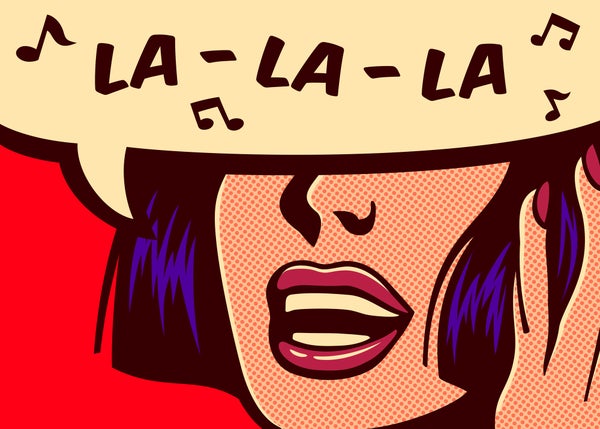
Drante/Getty Images
When comparing today’s hit tunes with the top 40 of past decades, strong opinions are never in short supply. Every generation seems to lament its successor’s musical tastes and listening habits. Though science can’t necessarily account for such subjective preferences or generational divides, new research suggests popular music has indeed undergone some measurable and significant shifts over the past 50 years—with popular song lyrics becoming simpler and more repetitive , according to a study published on Thursday in Scientific Reports .
“There’s more rhyming lines and also more chorus,” says the study’s senior author Eva Zangerle , a computer scientist at Austria’s University of Innsbruck, who has developed music recommendation algorithms. “We basically found that lyrics [have gotten] easier to comprehend.” This trend, observed across five of the most popular English-language music genres (pop, rock, rap, R&B and country) since 1970, hints at how shifts in music listening habits, platforms and production may be shaping pop culture.
Zangerle and her co-authors compiled lyrics from 353,320 well-known songs released between 1970 and 2020. They used machine learning to single out these songs’ key linguistic features, such as the ratio of repeated words, the types of emotional cues, a readability score and the richness of vocabulary. Then they developed and trained additional models to sort and analyze those features across years in a representative subset of 12,000 songs.
On supporting science journalism
If you're enjoying this article, consider supporting our award-winning journalism by subscribing . By purchasing a subscription you are helping to ensure the future of impactful stories about the discoveries and ideas shaping our world today.
The researchers discovered that the ratio of repeated to nonrepeated lines has ticked up across genres over the years, nearly doubling for pop songs and rising even more rapidly for rap music. The ratio of choruses to other song sections rose as well. The study also found that contemporary music lyrics convey more negative emotions and fewer positive ones than in the past and that songs have become more personal, with a higher frequency of pronouns such as “I” and “me”—echoing past research findings about shifts in lyrical content .
“I thought this study was really cool,” says Michael Varnum, a cultural psychologist at Arizona State University, who was not involved in the new research. Varnum has previously studied popular music and detected similar declines in lyrical complexity over time. This new work replicates those findings with a more inclusive sample, he says, by surveying an order of magnitude more songs, comparing across genres and looking beyond the biggest chart-toppers to assess the larger landscape of what people listen to.
Yet even this study’s expansive dataset isn’t completely comprehensive. Its focus on English-language songs—compiled from the online platform Genius—means it is inherently biased toward the Western cultural canon, Zangerle says.
Emotional intention and meaning, too, are hard to parse from lyrics alone, says Robin James , an independent popular music and philosophy scholar. James points out that slang terms such as “slay” might appear angry or violent in an automated assessment but actually convey a positive emotional meaning. Even complexity is challenging to quantify, she adds. Lyrics that seem like simple gibberish at first can actually be clever wordplay, James points out, noting Missy Elliot’s backward lines in the 2002 hit song “Work It.”
And lyrics are just one small part of what makes up a song, says Kaleb Goldschmitt, an ethnomusicologist at Wellesley College and co-editor of the Journal of Popular Music Studies . Even if lyrics are getting simpler, musical factors such as texture and rhythm seem to be getting more complex, Goldschmitt says.
Still, shifts in lyrical structure—particularly a boom in choruses—are apparent enough that music scholars have already been noting the trend for a few years, James says. It isn’t clear why these repeated sections are taking up more time in songs. But based on his past research, Varnum hypothesizes that the sheer amount of new music being produced could partially explain the phenomenon. “When people are faced with lots and lots of choices, they tend to prefer things that are easier to process and more straightforward,” he says.
The way people interact with songs has also shifted, Varnum adds, with more and more listeners tuning in to music while multitasking. “It would make sense that if it’s in the background, you don’t necessarily want things that are going to be challenging or attention-grabbing,” he says.
Today’s prevalence of streaming, Zangerle suggests, may also play a role by changing the ways artists compose for their market. Instead of investing in a whole album based on a single familiar song, listeners can now easily—and freely—preview every song an artist makes. This could ramp up pressure on artists to ensure all their songs are as catchy as possible.
But catchiness isn’t inherently negative, and music fans shouldn’t overthink what they like to hear. “Whether [the trend is] good or bad—that’s something I try to stay out of when thinking about science,” Varnum says.
“Complex music isn’t necessarily better music,” Goldschmitt notes. “If that were the case, we’d all be listening to prog rock.”
Illinois Global Institute
Russian, East European, and Eurasian Center
- Undergraduate Programs
- Graduate Programs
Fall 2024 Courses with Russia, East Europe, and Eurasian Content
- Current Courses
- Area Studies Courses Catalog
- FLAS Fellowships
- Language Courses Catalog
- Courses in the REES Rubric
- Funding Opportunities
- Study Abroad
- Administration & Staff
- Student Staff
- Executive Committee
- Faculty Affiliates
- REEES Students
- FLAS Fellows
- Regional Affiliates & Research Associates
- Visiting Scholars
- REEEC Events Calendar
- Public Lecture Series
- Conferences and Workshops
- Events Archive
- K-12 and Community Outreach
- Open Research Laboratory
- Summer Research Laboratory
- For Students
- For Faculty
- For Researchers
- Professional and Employment Opportunities
- Education and Humanitarian Resources on Nagorno-Karabakh
- Russia's War on Ukraine: Educational and Humanitarian Resources
- Multimedia Library
- Get Involved
- Mission and History
- REEEC at Illinois
Note: The courses listed below are not an exhaustive list of courses being offered on the REEE region. Please see course explorer for additional classes.
*Check with Advisor or FLAS Coordinator whether the course will fulfill area studies course requirements
Area Studies
BCS 115: South Slavic Cultures Peter Wright 12:30PM – 01:50PM, TTR, Location TBD
Exploration of South Slavic cultures in the historically rich and complex region sometimes referred to as "the Balkans," focusing particularly on those groups found within the successor states of the former Yugoslavia. Critical look at the traditional view of the region as the crossroads or the bridge between East and West, and at the term Balkanization which has become a pejorative term used to characterize fragmented, and self-defeating social systems.
HIST 168: A History of Judaism* Instructor TBD 12:30PM-1:50PM, TTR, Location TBD
Examines the social, political, economic, and intellectual history of the Jews from Abraham to the present-day, with particular attention to Jewish thought and society.
HIST 274: US Foreign Relations, 1917-* Prof. Kristin Hoganson 12:00PM - 12:50PM, MWF, 223 Gregory Hall
Over the course of the twentieth century the United States rose to superpower status, in the process profoundly shaping world affairs. Students will study the connections between U.S. and global history in this pivotal period. Explores the impact of the United States on world affairs from roughly 1917 through the end of the Cold War. Attention given to the perspectives of people affected by U.S. policies and the limits of U.S. power in the face of developments such as anticolonial nationalism and great power rivalries.
HIST 353: European History 1918 to 1939* Peter Fritzsche 11:00AM-12:20PM, TTR, 393 Bevier Hall
Survey of European society from 1918 to 1939, with emphasis on the impact of World War I, the Russian Revolution, fascism, and the intellectual trends of the twenties and thirties. This course examines the political and cultural environment of Europe from the demise of the continental empires after World War I to the dawn of the thousand-year Reich at the start of World War II. This Age of Extremes saw the rise of liberal democracies, the flourishing of new artistic movements, and the birth of new technologies such as film. At the same time, this period was also marked by the ascension of dictators, crises in colonial empires, and one of the largest economic crisis in history. Perhaps more famous (or infamous) than these events are the individuals we will cover, which includes the likes of Neville Chamberlain, Francisco Franco, Adolf Hitler, and Joseph Stalin. We will explore the period through a variety of sources, including speeches, contemporary films, and a novel concerned with an even greater threat: newts.
LAW 657: International Human Rights Law* Francis Boyle 03:00PM - 04:30PM, MT, Online
Based primarily on a series of contemporary “real world” problems, the course introduces the student to the established and developing legal rules and procedures governing the protection of international human rights. Its thesis is that there exists a substantial body of substantive and procedural International Human Rights Law, and that lawyers, government officials, and concerned citizens should be familiar with the policies underlying this law and its enforcement, as well as with the potential it offers for improving the basic lot of human beings everywhere. Additionally, the course presupposes that the meaning of “human rights” is undergoing fundamental expansion, and therefore explores Marxist and Third World conceptions of human rights as well as those derived from the liberal West.
Sequence and Prerequisites: None
Evaluation: Paper
Categories: International and Comparative / Upper-Level
MUSC 449: Balkanalia Donna Buchanan 6:00PM - 8:50PM, T, 0061A Music Building
Instruction and experience in the performance of various non-Western and vernacular music traditions such as African mbira, Andean panpipes, North American string band, Gamelan Kebyar, European and South American traditional music, etc. Topics vary according to available instructors. Course Information: 1 undergraduate hour. 1 graduate hour. May be repeated to a maximum of 3 hours in the same term if topics vary for a total of 16 undergraduate hours, 12 graduate hours in separate terms. Prerequisite: Consent of instructor.
REES 200: Intro to Russia and Eurasia TBD 9:30AM - 10:50PM, TTR, G24 Literatures, Cultures, & Linguistics
Eurasia, geographically between the “East” and the “West,” encompasses 11 time zones and over 100 different ethnic groups. Its multicultural complexity and political diversity over recent centuries have made it a rich source for the study of political, economic, and social change. This interdisciplinary course introduces students to key issues and themes that cross disciplines and are important for understanding the contemporary socio-politics of the region. As a class we will draw out these themes by examining major texts, novels, poems, film, and music that were not only impactful within their own genre, but whose influence has rippled throughout disciplines to become interdisciplinary. Major themes to be investigated include: regional interactions/geopolitics, socioeconomics, political action, subjectivity and alterity, identity, gender, and ethnicity & race.
REES 495/ 550: Seminar in REEE Studies Maureen Marshall 3:00PM - 4:50PM, TR, Room 1110 Literatures, Cultures, & Linguistics Interdisciplinary seminar involving faculty in a number of disciplines. The course examines Russia, Eastern Europe, and Eurasia and the methodologies of its study through questions of identities, cultural values, and change.
RUSS 1 15: Intro to Russian Culture David Cooper 2:00PM - 2:50PM, MWF, TBD
Introduction to the culture of Russia and the USSR. Course addresses two central themes. First, the very distinctiveness of Russian culture, and the functions of that notion within Russia and for outsiders; Second, Russia as a cultural space between East and West. We will explore Russian culture through the following, the language(s); foundational narratives of collective memory going back to the medieval times; the cultural impact of colonial subjugation both by and of peoples to the East, South, and West; Russian Orthodoxy's connection with the political and cultural spheres; peak achievements in literature, music, architecture and visual arts. Course Information: Same as REES 116.
RUSS 220: Golden Age of Russian Lit David Cooper 12:30PM-1:50PM, TTR, 1136 Literatures, Cultures, & Linguistics
Survey of Russian literature in the long 19th century; romanticism, realism, nationalism, orientalism, empire; writers may include Pushkin, Gogol, Lermontov, Pavlova, Turgenev, Dostoevsky, Tolstoy, Chekhov, and others; reading and discussion in English. Course Information: Same as CWL 227.
RUSS 514: Russian Literature After 1956 Richard Tempest 12:00PM-1:50PM, M, Location TBD
Graduate-level survey of Russian literature of the second half of the twentieth century. Course focuses on the questions of the Soviet "before" and "after," considering specifically the development of socialist realism after its High Stalinist period, its late-socialist manifestations, and theories of post-modernism as applied to late and post-Soviet Russian Literature and culture. Novels, films, and theoretical texts (focusing on the periods of the 1960s, stagnation, collapse, and "after") will provide a common base for thinking about late and post-Soviet culture. Course Information: 4 graduate hours. No professional credit. Prerequisite: Ability to read in Russian or consent of instructor.
SLAV 117: Russ & Euro Science Fiction Richard Tempest 3:00PM-4:50PM, MWF, Location TBD
Survey of the science fiction writing of Russia and the countries of Eastern Europe since 1750, with particular emphasis on the post-World War II period. The role of the Science Fiction tradition in the respective national cultures. The influence on Russian and East European Science Fiction of Anglo-American Science Fiction. All readings are in English. Course Information: Same as CWL 117.
SLAV 452/CWL 453: Slavic Cultural Studies “Kyiv: A Biography of a City” Instructor: Prof. Valeria Sobol 2:00PM - 3:20PM, TTR, Location TBD
This course traces the historical, social, and artistic development of Kyiv as a city and as an idea from the medieval period to the present day. As we read a variety of literary works and watch several films in which Kyiv figures prominently, we will think about what makes up this city’s “text” and pay special attention to its frequently competing Ukrainian, Russian, Polish, and Jewish versions. The course is conducted in English, and all the texts will be available in English translations.
SLAV 452: Polish Cinema Instructor: Prof. George Gasyna 11:00AM - 12:20PM, TTR, Location TBD
Selected topics in the literatures of Russia and Eastern Europe. Topics covered will range from in-depth studies of specific authors, time periods, and thematic discussions of specific genre and literary traditions. Readings in English unless specified. Course Information: Same as CWL 453. 3 undergraduate hours. 4 graduate hours. May be repeated to a maximum of 6 undergraduate hours or 8 graduate hours in same term; or 9 undergraduate hours or 12 graduate hours in separate terms. Prerequisite: Two years of literature, preferably Russian or East European; or consent of instructor
TURK 270/ANTH 272/GLBL 272/SAME 272: Languages and Culture in Turkey Ayse Ozcan 11:00AM – 12:20PM, TTR, 3038 Campus Instructional Facility
As a country located at the crossroads of Asia, Europe and Africa, Turkey has always been under the spotlight. In this course, we will study the dynamic relationship between language and culture in Ottoman and modern Turkey through a timely analysis of its transition from a long-lasting empire to a young "secular" nation-state. We will examine the complexities of Turkish modernity from a holistic perspective to better comprehend how central Asian and Middle Eastern cultural influences, continuities, and transformations gave birth to modern Turkish language. The course should help you not only in developing an understanding of the Turkish language within a cultural framework, but also in gaining insight into Turkey's history, politics, literature, and media. No former knowledge of Turkey or the Turkish language is required.
UKRA 113: Ukrainian Culture Prof. Valeria Sobol 3:30AM-4:50AM, TTR, G24 Literatures, Cultures, and Linguistics
Course situates Ukrainian culture in the broad context of Slavic nations. Acquaints students with Ukrainian culture from the origins of Kievan Rus' in the Middle Ages to the present. Includes highlights of historical-cultural events, an overview of literature and of the arts, as well as an outline of Ukrainian folklore. No knowledge of Ukrainian required.
“The goal of this course is to acquaint students with Ukrainian culture from the origins of Kyivan Rus in the Middle Ages to the present. The course will examine the many facets that make up culture: history, politics, language, literature, folklore, religion, music, art, cinema, education, etc. It will also place Ukrainian culture in the broader context of the Slavic nations and peoples. Topics in contemporary Ukrainian culture will be given special emphasis. Lectures and readings will all be in English.”
For other languages and courses available through the BTAA contact [email protected]
Bosnian-Croatian-Serbian
BCS 10 1 : First Year Bosnian-Croatian-Serbian I
MTWR 09:00AM - 09:50AM, 1020 Lincoln Hall
BCS 20 1 : Second Year Bosnian-Croatian-Serbian I
MTWR 10:00AM - 10:50AM, 1030 Literatures, Cultures, & Linguistics
BCS 301 : Third Year Bosnian-Croatian-Serbian I
MWF 10:00AM-10:50AM, Location TBD
CZCH 102 : Elementary Czech I
MTWTR: 09:00AM - 9:50PM, Online
POL 1 01 : Elementary Polish I
MWTR 10:00-10:50, 1126 Literatures, Cultures, & Linguistics
POL 20 1 : Second Yr Polish I
MTWTR 11:00-11:50, 1038 Literatures, Cultures, & Linguistics
RUSS 10 1 : First-Year Russian I
MTWR 10:00-10:50, 316S Mumford Hall
MTWR 11:00-11:50, 241 Armory
RUSS 20 1 : Second-Year Russian I
MTWR 11:00-11:50, 134 Armory
RUSS 30 1 : Third Year Russian I
MWF 11:00-11:50, 1040 Literatures, Cultures, and Linguistics
RUSS 40 1 : Fourth Year Russian I
MWF 12:00-12:50, 1020 Lincoln Hall
RUSS 50 1 : Russian for Grad Students I
TTR 01:00-2:20, 1018 Literatures, Cultures, and Linguistics
TURK 20 1 : Elementary Turkish I
MTWRF 09:00-09:50, 1126 Literatures, Cultures, and Linguistics
TURK 40 3 : Advanced Turkish I
MTWTR 10:00 AM - 10:50 AM, Location TBD
UKRA 10 1 : Basic Ukrainian I
MTWR 10:00-10:50, 241 Armory
UKRA 20 1 : Second-Year Ukrainian I
MTWR 10:00-10:50, 241 Armory

IMAGES
VIDEO
COMMENTS
Music is important in our everyday lives and it's a common discussion topic in English, too. Learn to talk about the music you like in English using these key words and expressions. To describe music, you will need a few key words. Firstly, we can use the word tempo to talk about whether music is fast or slow and the word melody to talk about ...
70 Music Conversation Questions. Music is a big part of our lives, we listen to music while we do different things, whether we are commuting to work or working on our computers. Since we all listen to music, music can be an interesting topic to connect with others easily. These are some examples of interesting music conversation questions: Do ...
80 conversation questions about music. Asking questions about music is a fun way to put your English speaking skills to the test. Music is a universal experience that everyone on the planet is deeply connected to in some way, so it's an excellent ESL discussion topic for every classroom. Whether you're trying to make small talk with someone ...
7. Tune. In music, a tune is a series of musical notes which sound pleasing or harmonious. "To tune" can also mean fixing the pitch of a musical instrument so that it sounds right. In informal English a "tune" is simply a piece of a song or music. I simply cannot get that tune out of my head.
Can you say why you like a piece of music? In this free Oxford Online English listening lesson, listen to two people with very different tastes arguing about what to listen to. You can learn some new words and phrases for talking about music in English. This lesson is for intermediate learners. Listen to the dialogue at normal speed here: 00:00.
Conversation QuestionsMusic. A Part of Conversation Questions for the ESL Classroom . What kind of music do you like? Are you a good singer? Can you concentrate on other things when you are listening to music? Can you play a musical instrument? If so, what do you play? How long have you been playing?
Conversation Questions about Music. Would you like to talk about music? Here are some conversation questions to get you started. What kind of music do you like? Do you like (insert music genre)music? (For example: Do you like rock music? Do you play the (insert instrument) (For example: Do you play the guitar?) Can you play a musical instrument?
In this lesson learn how to talk about music in English. Explore which questions you may be asked and learn how to answer them. In addition, learn music-sp...
Hello everybody! Let's talk about music, melody and rhythm. Music is a series of musical notes that agree with each other and "sound nice". If the notes are random, without musical structure, and do not make sense, we call this noise. Melody is often called the tune. We make a tune using the notes of a scale. This is a note—middle C.
Learn how to talk about music likes and dislikes, using adjectives and the present simple. Learn English vocabulary and expressions to talk about music. A po...
They feature kinds of musical instruments as well as musical genres. The most challenging words on this handout include - spend (time), instrument, record, cassette, busk, beg, can't stand, genre, equipment, foreign, illegal, traditional, require, taste, and funeral. The music conversation questions are -. What are your 3 favorite kinds ...
In this English lesson I'll help you learn all about music in the English language. We'll talk about all kinds of things related to music. During the lesson ...
Find over 130 useful words & phrases of music vocabulary, plus practise IELTS-style questions & answers with PDF downloads & other resources. Music is a common IELTS topic so studying this page will be great preparation for your exam. Created to make your life easier.
Download Full Lessons Package - Daily English Conversation by Topic (mp3+pdf) Listening is THE KEY to better English speaking. The more REAL English conversations you listen to, the more fluent you will become, to be sure. For a small one-time investment, you can get the whole package of 75 lessons. Put it into your phone or MP3 Player and ...
EnglishClub: Learn English: Vocabulary: Topic: Music Music Vocabulary. People all over the world love listening to music. They love going to concerts to hear live music, and they love listening to recordings of their favourite artists.If you love music too, and you'd like to read about music and learn lots of music vocabulary, this section of EnglishClub is for you.
Music is a part of us and it's a part of how we put meaning in our lives. You want to be able to communicate this to others, and this allows for some great connections. You may start a conversation about a favorite band, or even discuss how a certain song can take you back to a time in your life. Music is universal and crosses cultures, and ...
100 Questions about Music for the ESL Classroom. Manuel Campos. -. December 26, 2023. I love music and I think that asking questions about music is one of the ways to generate very interesting connversation. There are different types of music so I don't expect that all of us like the same things. These are some of the most common types of ...
2- Suggested videos - Topic Music. You need to train your ears to get familiar with how native speakers talk about Music, and also to broaden your vocabulary. eJOY Epic - Laptop. If you own a PRO eJOY account, you can learn with the following video to practice listening comprehension, grammar, and vocabulary. Learn with Why We Create Music.
bluegrass (noun): a style of country music based on old-time Appalachian music - We're going to a bluegrass concert tonight. (the) blues (noun): African American guitar-based folk music that led to R&B and rock - I'm learning some old blues songs. bpm (noun): beats per minute - The fastest drum and bass tracks are around 160 bpm.
To prepare well for answering such questions read IELTS speaking sample for Music Topic below. It has part 1-3 questions with model answers and advanced vocabulary to help you succeed in IELTS. Our special formatting styles: Useful linking phrases are in blue. IELTS speaking vocabulary is in bold (put your mouse over such text to see explanations).
The power of music is inevitable. Without music, life would be very dull and boring, but with the music, even your bad times will sound perfect, as now you can align your emotions well, this, in turn, will help us to deal with bad times. For me, music uplifts the soul, energizes me. While I derail from the purpose music pulls me back on track.
That's the easy part. When it comes to topic selection, either you need to be a writer with a deep breadth of knowledge across a variety of topics, and be at least somewhat knowledgeable research your way to the finish line. Or, you need to possess such great depth of knowledge in one single subject that you can uncover (come up with) a ...
Music To Your Ears. Music is another popular topic that could come up in any part of the speaking exam. Practice your vocabulary and speaking skills for part 2 of the speaking paper with the sample question below. The examiner will ask candidates to speak for 60 seconds answering a question about 2 pictures. Candidates should practice speaking ...
This trend, observed across five of the most popular English-language music genres (pop, rock, rap, R&B and country) since 1970, hints at how shifts in music listening habits, platforms and ...
Spotify Technology has hired Christian Luiga, chief financial officer at Swedish defense and security company Saab, to be its next CFO, as the music-streaming company aims for consistent ...
SLAV 452: Polish Cinema Instructor: Prof. George Gasyna 11:00AM - 12:20PM, TTR, Location TBD Selected topics in the literatures of Russia and Eastern Europe. Topics covered will range from in-depth studies of specific authors, time periods, and thematic discussions of specific genre and literary traditions. Readings in English unless specified.